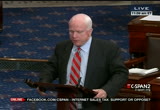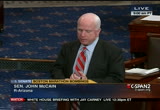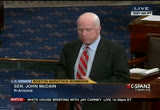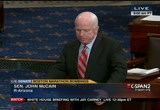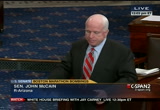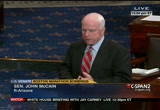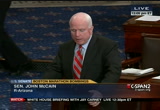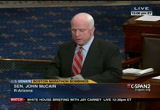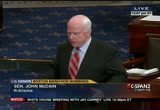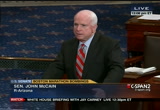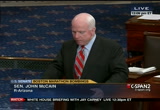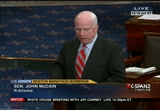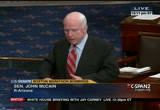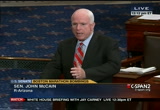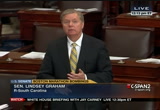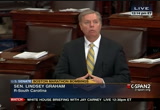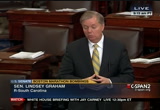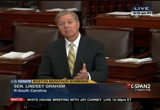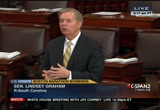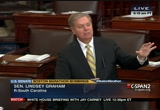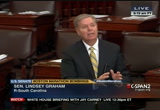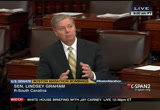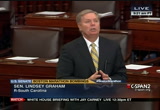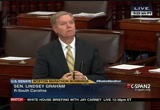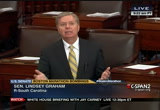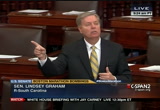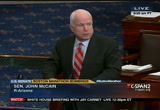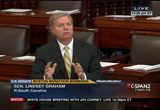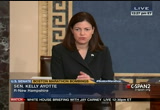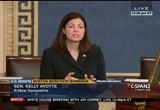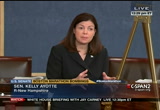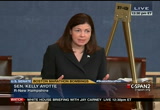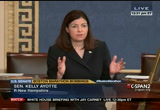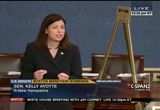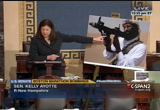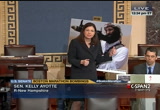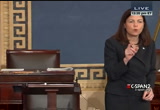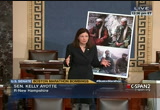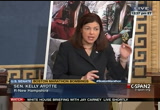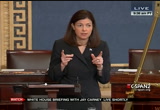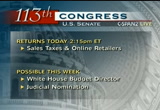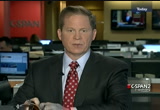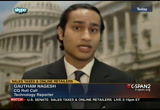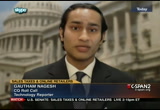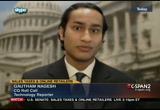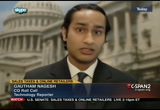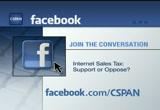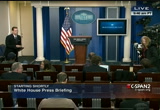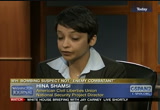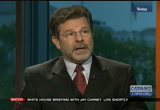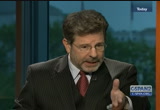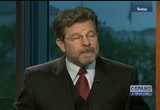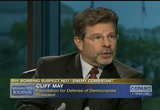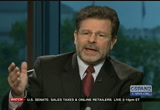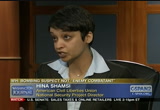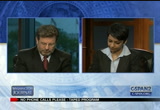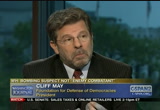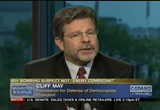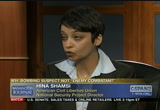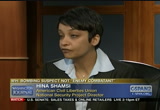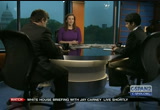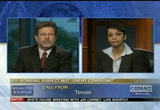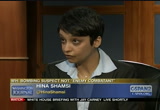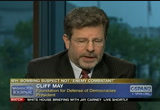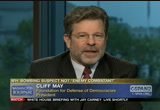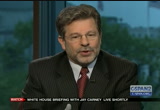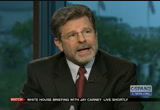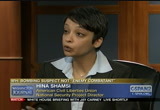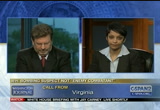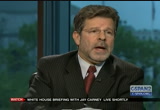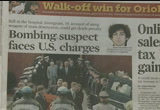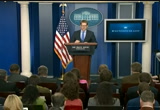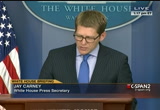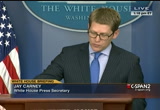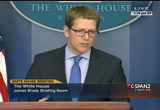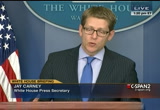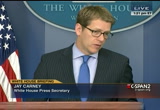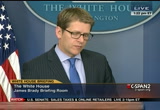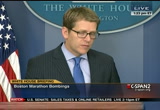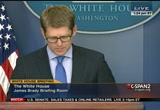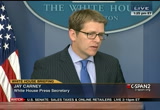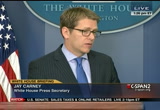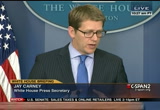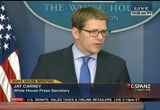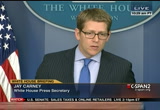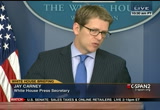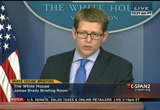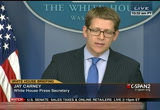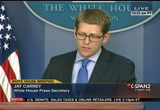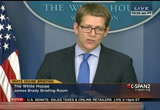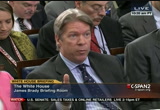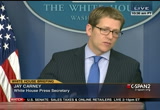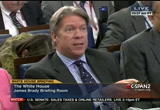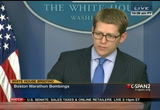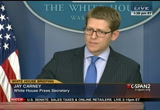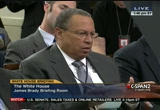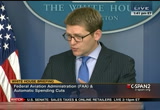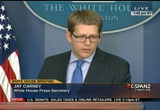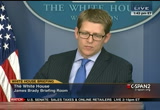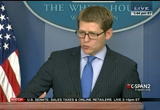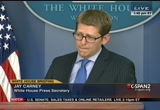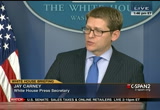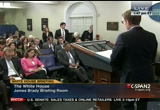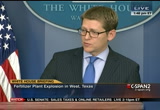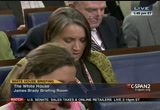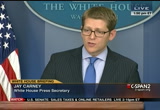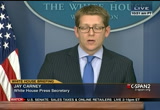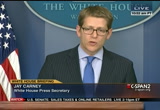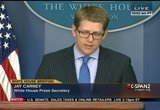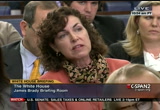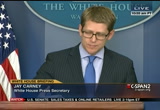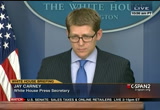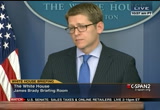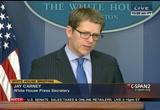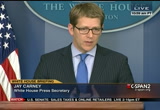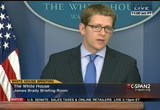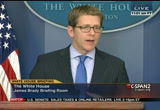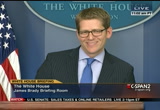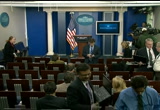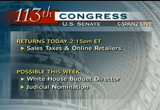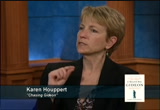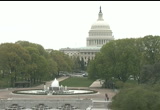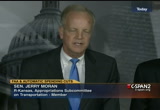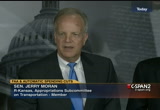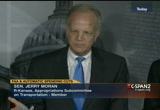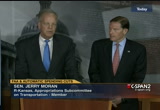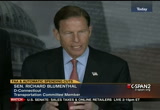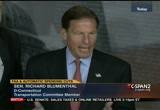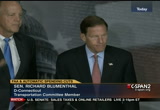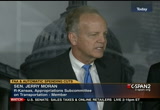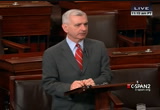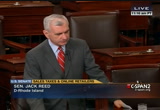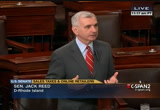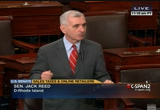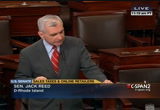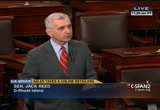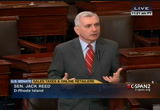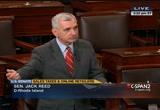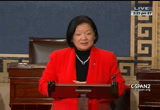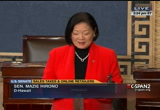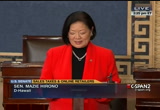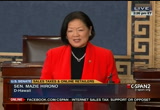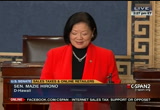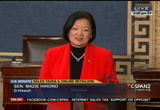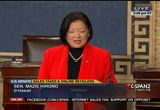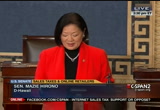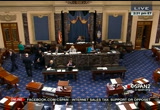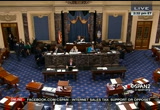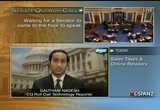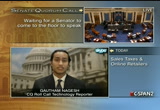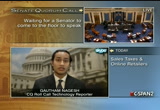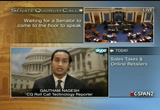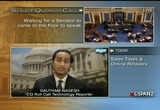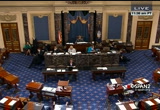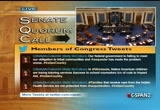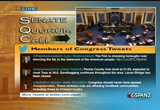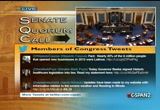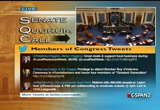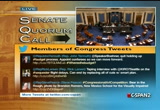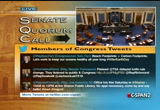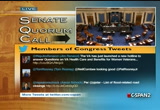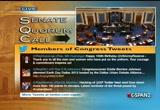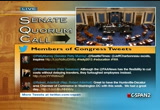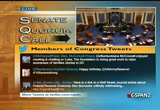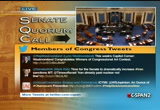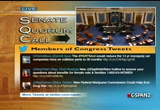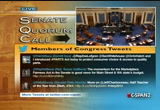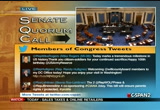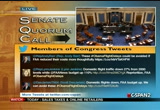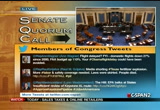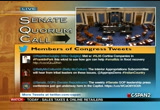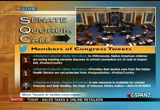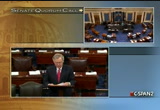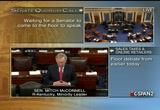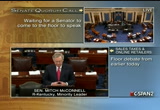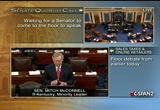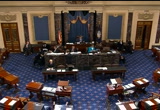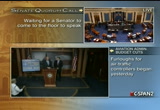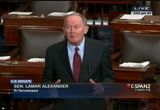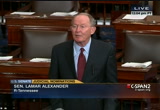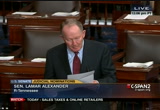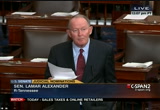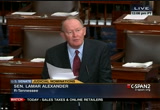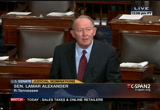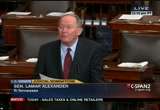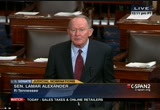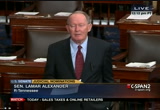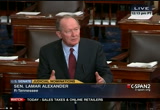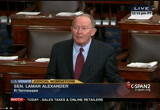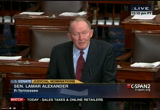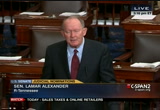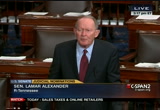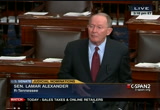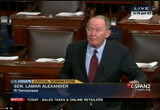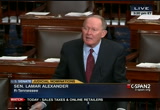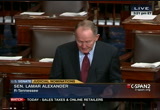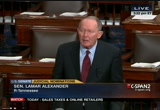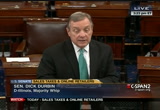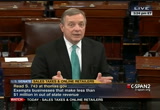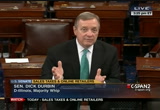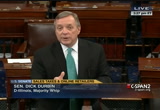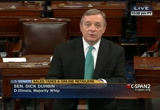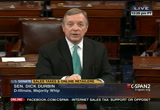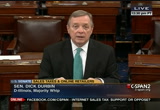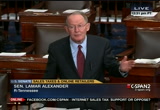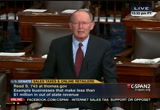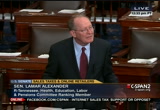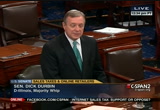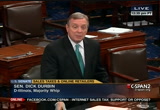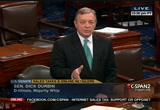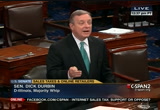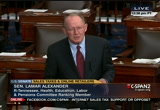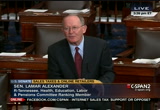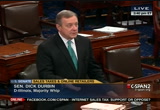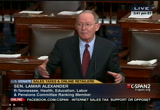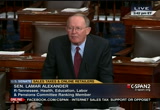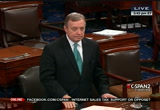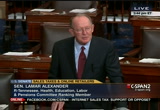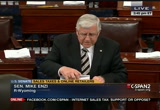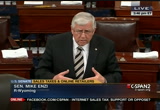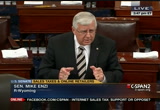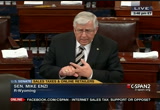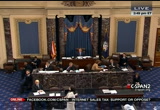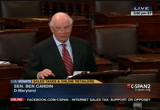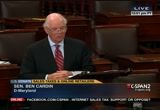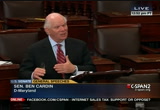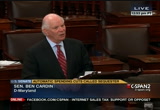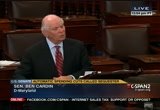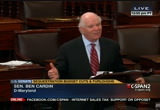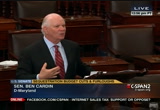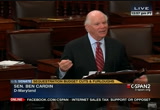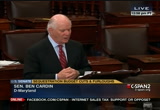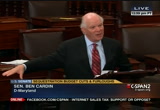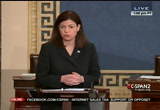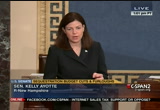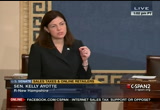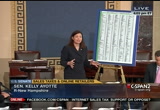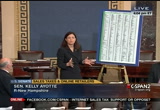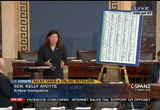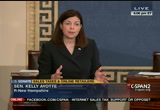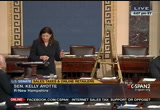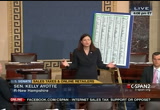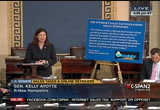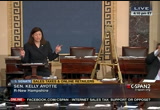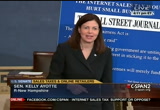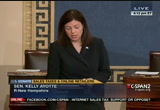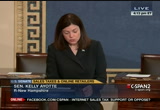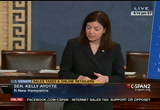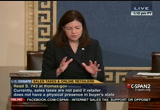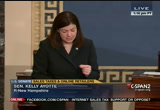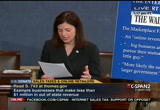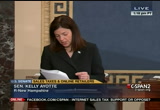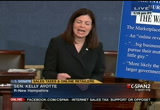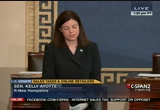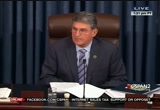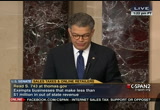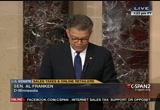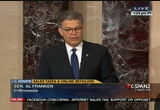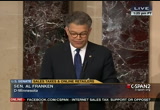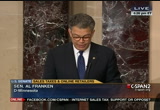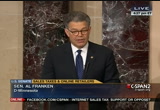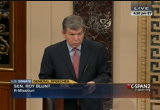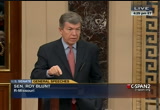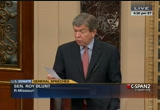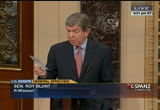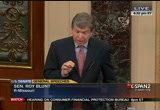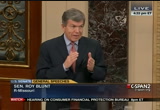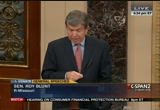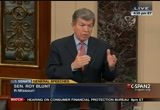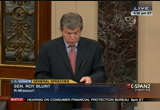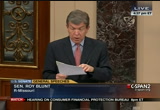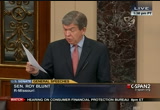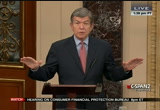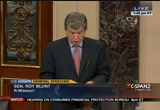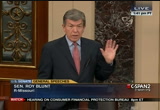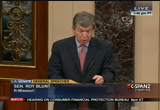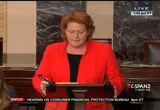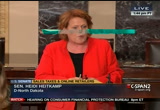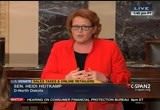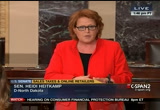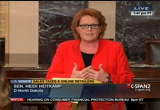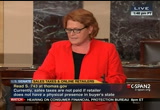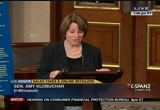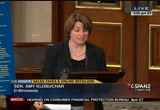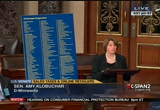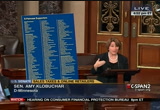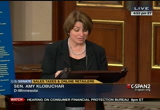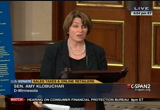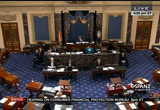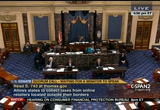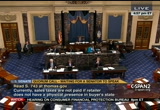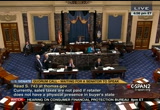tv U.S. Senate CSPAN April 23, 2013 12:00pm-5:00pm EDT
12:00 pm
the suspect is a u.s. citizen and must be treated accordingly, and he will be. what we are saying is that the importance of treating the suspect in accordance with his rights as an american citizen must be balanced with our government's top national security priority, which is the lawful effective and humane interrogation of this subject for the purposes of gathering intelligence. the boston attacks were clearly inspired by the violent ideology of transnationallist islamist terrorism. so we need to learn everything we can about what foreign terrorists or terrorist groups the suspect and his brother might have associated with, whether they were part of additional plots to attack our nation, and what other relevant information the suspect may possess that could prevent future attacks against the united states or our interests. i think we need to delve further
12:01 pm
into this whole issue of the education that some people who are motivated by these base ideologies obtain over the internet and the effect that it's having. we should at least know about that. our civilian justice system offers a responsible option for striking this balance with american citizens. it allows the justice department to delay reading a suspect his miranda rights if doing so is in the interest of -- quote -- "public safety." the administration had rightly invoked this public safety exception in the case of the boston suspect which provided our national security professionals a discreet period of time to gather intelligence from the suspect without the presence of his lawyer. however, soon after questioning him this way, the administration recently reversed itself and read the suspect his miranda rights.
12:02 pm
in doing so, the administration, in my view, gave up a valuable opportunity to lawfully and thoroughly question the suspect for purposes of gathering intelligence about potential future terrorist plots. whether we will be able to acquire such information has now been left entirely at the discretion of the suspect and his lawyer. put simply, the suspect has been told he has the right to remain silent, and if he doesn't want to provide intelligence, he doesn't have to. is this a responsible balance between a citizen's rights and our national security? the suspect had only been responsive for a couple of days before he was read his miranda rights, and even then, he could not communicate verbally. does anyone really believe that our national security professionals were able to acquire all of the relevant intelligence possessed by a
12:03 pm
subject who couldn't talk in only two days? this is not a responsible balance between civil liberties and national security. fromat the very beginning of ths debate, the senator from south carolina and the senator from new hampshire and i and others have maintained that the administration should reserve its right to hold the suspect as an enemy combatant for the purposes of gathering intelligence. the full extent of whether the -- the brothers' trip too russia certainly should be the subject of an inquiry.
12:04 pm
and additional questioning is critical to i can maain ma makit clear, but today there's ample evidence that would alou the administration to question the suspect for key intelligence. the consequences of not doing so is that our they'd to question the ussr expect for such intelligence is left solely at his discretion and willingness to cooperate. that's not a responsible approach to the national security of this country. again, this is not to say that we must hold the suspect indefinitely in military detention, nor that the suspect must be or should be tried in a military tribunal. in both cases, there is plenty of precedents for holding a terrorism suspect as an enemy combatant for a limited time before moving him into the criminal justice system for the purposes of standing trial before in civilian court.
12:05 pm
what's more, the supreme court has consistently upheld the legality and constitutionality of this approach as well as the ability to hold american citizens as enemy combatants. but ultimately, the broader question is whether you view the united states as part of the battlefield in the global fight against terrorists. i know that some don't. i, however, do not see how we can avoid this fact! those who seek to attack us certainly view the homeland as part of the battlefield. indeed, the central part. of course, there will be always be and should be differences in how we handle events in the united states and events overseas, and differences in what rights are due to american citizens as opposed to foreign citizens. and yet we cannot afford to build a wall between the fight against terrorists abroad and the fight against terrorists who
12:06 pm
are trying to attack us here at home, including when american citizens are involved in this fight, as some clearly are and will continue to be. just because some don't seem to want to grapple with the difficult, even unprecedented legal issues that this war presents does not mean they will cease to be real challenges. and if we pretend that the homeland, the united states of america is not part of this battle, i fear it will only be a matter of time before we learn this lesson the hard way. so i say to many who are reporting on this issue, i hope it is clearly understood, we are not saying that the suspect should be indefinitely detained as an enemy combatant by the u.s. military or tried in a military tribunal. the suspect is a u.s. citizen
12:07 pm
and must be accordingly -- be treated accordingly and he will be. during the -- during the now-famous discussion of 13 hours on the floor of the senate, there were certain comments made which i think are important to recall. one of the quotes -- "the battlefield coming to america or acknowledging that is an enormous mistake." i'm quoting from the debate that took place. quote -- "alarm bells should go off when people tell you that the battlefields in america." unquote. quote -- "i'm here to argue that we can't let america be a battlefield because we're saying that we are no longer going to have due process, that we are no longer going to have trial by jury, that we are no longer going to have presentment of charges in grand juries. it is impossible in a battle
12:08 pm
feed." another quote -- "when people say oh, the the battlefield has come to america and the battlefields every -- where the war is limitless in time and scope be worried because your rights will not exist if you call america a battlefield for all time." i think the chair understands this as well as anyone, that the people of boston and the people of massachusetts -- of the commonwealth of massachusetts would clearly take exception to a statement like -- quote -- "the battlefield coming to america are acknowledging that that is an enormous mistake." i think the people of boston are very well aware that the battle comes to the united states. there are many attempts that it come to the united states and tragically it came to the united states of america in a most tragic and terrible way.
12:09 pm
so we need to have a larger debate here about where the battlefield is and to somehow believe that the ultimate target of these radical islamic extremists and other extremist elements is not the united states of america is a gross misreading of what this fight against terrorism is all about. i'd like to quote from the "wall street journal" editorial. i have quoted from "the wall street journal" in the past. quote -- "the boston bombing also ought to chasten libertarians who keep insisting that the united states homeland is not part of the terror battlefield." quote -- "it's different overseas than it will be here. it's different in the battlefield than it will be here, one member told fox news earlier this year. quote, which gets precisely to the argument i have with some other republicans who say well -- quote -- the battlefield is
12:10 pm
everywhere, there is no limitation. president obama says this. some members of my party say the battle has no geographic limitations, and the laws of war apply. it's important to know that the law of war that they're talking about means no due process. boyleston street sure looked -- "i quote from the" wall street journal "editorial." boyleston street sure looked like a battlefield on monday and so did watertown on thursday night. the artificial distinction arises from undue focus on geography. the vital distinction for public safety is between common criminals who deserve due process protections and enemy combatants at war with the united states wherever they are. as for due process, the greatest danger to liberty would be to allow more such attacks that would inspire an even greater public backlash against muslims or free speech or worse.
12:11 pm
the antiterror types on the left and g.o.p. senators who agree that the u.s. isn't part of the battlefield are making the united states more vulnerable. americans erupted in understandable relief and gratitude on friday with the rapid capture of the terrorist brothers, but we shouldn't forget that their attack succeeded with horrific consequences for the dead, the wounded and their loved ones. the main goal now is to prevent the next attack. so how do you prevent the next attack is you find out as much information as possible as to what motivated this attack. and i want to say again, i ask unanimous consent that the senator from south carolina be included in the colloquy. the presiding officer: without objection. mr. mccain: we want to make sure that our position is very clear. we are not saying that the subject should be indefinitely
12:12 pm
detained as an enemy combatant by the u.s. military or tried in a military tribunal. the suspect is a u.s. citizen and must be treated accordingly and he will be, but i think the tragic events that we saw in boston brings home again that this fight is far from over. i don't know if these young men were motivated by the information they received or whether it was overseas, whether it was due to the internet and various influences there, but what we do know is that they change from apparently normal young people who are living in this country into terrorists who are willing to do anything to take the lives of their fellow american citizens, and the battlefield is the united states of america, and anyone who doesn't believe that ignores the events that we just hopefully are recovering from. so i would ask the senator from
12:13 pm
south carolina who has probably been more widely quoted than i have to clear up that exact situation that we are calling for which frankly is being portrayed inaccurately in a great deal of the media. mr. graham: well, thank you, senator mccain. very simply put, i have two goals. i think most americans want two things to happen in this case. they want the surviving suspect to be brought to justice, and i am glad he survived because hopefully we can learn some information from him that will make us all safer in the future. i'm glad he survived so we can try him before a court of law in federal court in massachusetts to hold him accountable for his crimes. and in that trial, he will be given a lawyer. he has the right to remain silent. he will be tried by a jury. he will be given all the rights associated with a federal court trial. he's an american citizen, and we
12:14 pm
have never suggested otherwise. as a matter of fact, as being the author -- one of the primary authors of the 2009 military commission act, i expressly exempted american citizens from military commission trials. why? i wanted to reserve that system for foreign terrorists. it doesn't mean that i don't believe there will be domestic terrorism. it doesn't mean i can't -- i don't envision an american citizen helping the enemy. i do. every war unfortunately we have been in in the history of the country, american citizens have joined forces and sided with the enemy, and that's not an unusual event. what would be unusual is to say you could do so and not be treated under the law of war. we would be making history if we adopted that view. let me begin with the case in world war ii. german saboteurs land in long island. they have been planning for years an effort to come to our
12:15 pm
country. these are germans who had lived in america, went back to germany and became nazis, and they were recruited by the german intelligence service because they spoke good english to come over here and plan massive attacks on our homeland. they had a cell here in america, some of which were american citizens who joined the plot. thanks to the great f.b.i. work of that time and that day, as soon as they landed, the plot was foiled, the american citizens were cap tiewmpletd an. and in 1944, 1945 and i think maybe as late as 1956, the american citizens who aided the german saboteurs were held as enemy combatants and tried in a military court and three of them were hanged. their case went to the united states supreme court and the supreme court says, when you joined the forces of our enemy, you're committing an act of war, not a common crime. tokyo rose sided with the japanese. she was tried and given a life
12:16 pm
sentence. since 9/11, there have been three american citizens who have been with al qaeda or the taliban or affiliated groups. they have been held as enemy combatants. they have gone to trial in civilian court. and the courts have blessed the holding of american citizens as enemy combatants. rumsfeld v. hamdi was an american citizen who was captured in afghanistan, held under the law of war as an enemy combatant who was eventually tried. the court said, as in world war ii, we can hold one of our own as an enemy combatant, recognizing the difference between a common crime and the law of war. mr. pa difficult ymr. padilla ws by the bush administration. his case went to the fourth circuit. the fourth circuit held you can hold enemy combatants off the battlefield.
12:17 pm
that's what the government possesses at a time of war. when you're fighting a war, the goal is to find out what the enemy is up to. when you're fighting a crime, the goal is to convict someone or have them found innocent. there are two different systems. this young man will be going to federal court and a jury will decide if he's guilty of his crimes. what we're suggesting to the administration, how do you gather intelligence in that system? it's really not meant to gather intelligence. we don't want to limit ourselves to -- as a nation to asking questions about future attacks in the criminal justice system, because here's the way that works. if i'm his lawyer, i'm not going to let you ask him any question about anything until i get a benefit for my client. so intelligence gathering now is controlled by the terrorist suspect and their lawyer. is that really smart? now you're having to plea bargain to get intelligence. what we're saying is, conduct the trial in civilian court -- the only forum available -- but
12:18 pm
because there's international terrorist connections here, clearly they killed the people in boston not because they wanted their property or they were mad with the boston city government. they killed, they slaughtered the young boy and his family and others because they've adopted a radical jihadist view of us as a nation. the older brother was quoted as saying, we're infidels, we're a colonial christian power. we've corrupted islam. they're trying to kill us and destroy our way of life because of what we believe. the sooner we understand that, the better off we'll be. and here's my view about defending one's self as a nation. criminal court's about due process and giving the accused a fair trial. military intelligence gathering is about defending the nation at war. and the question we all have to answer to ourselves -- among ourselves, is america really at
12:19 pm
war? the answer to me is yes. we're at war with a radical ideology that hates everything that we stand for. bin laden is dead. we celebrate that. but al qaeda is very much on the march. as a matter of fact, radical islam is regenerating. and the way they are coming after us is to find people in our own backyard and turn them against us. how could we have missed this? how could the intelings intellie services in russia tell the f.b.i., you need to watch this guy, we believe he's a radical islamist coming to your country to hurt you. how could we miss him going to russia and coming back? how could we miss his youtube videos where he's ranting and raving against us and threatening to take us down as a nation? these are questions to be asked and answered. and here's what we're suggesting. that the surviving suspect, due to the ties that these two have to radical islamic thought and the ties to che chechnya, one oe
12:20 pm
most radical countries in the world, that the president declare preliminarily that the evidence suggests this man should be treated as an enemy combatant. we could hold him for a period of time. we could question him without a lawyer. and none of the evidence could be used against him in the criminal proceeding. but that's the best way to gathering intelligence. the best way to gather intelligence is to have a rapport with him, take the stories he's telling us and deconstruct them, spend time with him outside the criminal justice system. we've gathered so much good intelligence from enemy combatants at guantanamo bay. you won't send him to guantanamo bay. but during the last decade, we've exploited intelligence from enemy combatants, people who've joined the other side, and it's helped us figure out how to defend ourselves and find bin laden. all we're saying is that when it comes to defending against future attacks, we want to talk to him without a lawyer. that's all we're saying. we want to talk to him without a lawyer so we can find out what
12:21 pm
he may know about what we face in -- in future. and when it comes to prosecuting him, we won't -- we won't use anything that we've found to use against him. a first-year law student could convict him. but, my god, look what we're losing as a nation by using this model. instead of taking time out to interrogate him without the presence of counsel to learn about what really did happen, we're now stuck in a criminal justice system where we can't ask him one question his lawyer won't allow. and i'm not blaming the lawyer. my goodness, if i were his defense lawyer, you wouldn't ask him one thing without my permission and you would have to give a lot to get an answer to anything. all i'm suggesting is that we're at war, these two people fit the profile of folks who are trying to kill us, they're tied to overseas organizations potentially. why in the world can't our country have some time with this
12:22 pm
person in the national security legal system to find out about what he knows and how they planned this attack to make the rest of us safer? i believe in due process. and he in that system can go to a judge and say, i'm not an enemy combat expent the government would have to -- combatant and the government would have to prove you are. so he has due process there. but here's what i believe deeply, and then i'll turn it over to senator eye i can't telw hampshire. i believe the closer to get to your homeland, the more rights we have as a people to defend ourselves. i don't want a police state. i don't want to live in ath a country where you can't express who you are and what you believe in and who you are and have a different view of religion. but by god, given the times in which we live in, i don't want to become deaf and blind to the threats that are real in our own backyard. i want a system that can find out about guys like this before
12:23 pm
they kill us. and let mettl me tell you, ladid gentlemen, if with you don't gather good intelligence and we don't hit them before they hit us, there's more to come. so -- mr. mccain: mr. president, i ask unanimous consent the senator from new hampshire be included in the colloquy. the presiding officer: without objection. mr. mccain: and i ask my colleague just for a comment on the issue of whether the united states of america is a battlefield or not. or does he agree with the quot quote -- "the battlefield coming to america or acknowledging that is an enormous mistake." mr. graham: not only do i agree, who picked the battlefield? i didn't -- i didn't pick america to be the balt field. i don'battlefield. i don't want to be at war with anybody. they chose the battlefield. where do you think they would like to hit us most, senator mccain? if you could get the top leadership and give them one shot at america anywhere, where would they take that shot? would they hit us in france? they'd hit us here. why?
12:24 pm
because they want to destroy our way of life. they're trying to come here to kill us. and all i'm suggesting is we should be able to defend ourselves. and the closer they get to us, the more rights to defend ourselves we should have. and let me say -- just finish my thought. i asked the judge advocate generals of the army, navy, air force and the marine corps, is -- does the authorization to use military force against al qaeda, the taliban or affiliated groups, does it -- is it limited to outside the united states? and he said, no. there's no geographic limitati limitation. so if somebody hijacked a plane tomorrow trying to fly it into the capitol, our military could shoot it down. we're not going to restrict ourselves to the battlefield being everywhere else but in our own backyard. mr. mccain: and finally, again, if there were information of an imminent attack, such as the aircraft that might have -- that crashed in pennsylvania
12:25 pm
that might have been headed for the capitol, that we take whatever measures necessary to prevent it from happening. and to somehow say that we would not use every capability in our arsenal to prevent that i think again goes back to this fundamental error, fundamental misconception about the nature of radical extremists where the battlefield clearly is the united states and we should be most prepared. and, by the way, i think if there is some good news that came out of boston, some of the measures that have been taken since 9/11 contributed i think significantly to our ability to track down and eliminate this threat far more rapidly than we would have prior to 9/11. mr. graham: if i may, hat's off to the -- to the boston, massachusetts, police officers, to your town.
12:26 pm
you know, our heart breaks to the victims. bostonnans made us proud. they showed us how to stay brave. f.b.i., everybody did a great john. but how we missed this i still want to know. but the senator from new hampshire was the former attorney general of new hampshire. she knows the difference between fighting a war and fighting a crime. i've been a military lawyer. i've been a civilian lawyer. i'm all very much for the idea of due process being given to everyone charged with a crime, including this man. he deserves to be presumed innocent. a lawyer, a jury to find him guilty or innocent. he deserves all that because it makes us better and safer. but what we should not give up as a nations any, the ability to find out about -- as a nation, the ability to find out about future attacks in a logical way. we are at war and the law of armed conflict national security applies here, in my view, because of the type of incident involved and the threats we face. but i would like to hear from senator ayotte, who has become i think one of the most knowledgeable people on the topic.
12:27 pm
she has tried people in new hampshire, death penalty cases. and if you don't mind, senator, would you share with us your view of where the battlefield is, what kind of laws to apply to the situation like this. ms. ayotte: i thank my colleague from south carolina and very much my colleague from arizona, thank you for obviously your leadership on this issue. you know, i have great confidence in our criminal justice system, having both defended and tried criminal cases in that system. and it's -- the purpose of that system, of course, is to bring people to justice. and there's no question in this case, in light of what boston has gone through -- and i know the chair knows all too well how the crimes that were committed and the acts of terrorism essentially that were committed, that we need to make sure that the criminal justice system
12:28 pm
holds that individual, the terrorist who survived, accountable in the federal criminal system. and i am confident, based on not only what we've seen with video evidence but the great work done by our law enforcement officia officials, both at the local level in boston along with the cooperation of our federal agencies, that they did phenomenal work. and that evidence will be used against this terrorist in the federal court system and he will be found guilty. in fact, with the overwhelming evidence, this is not a difficult case to prosecute and we should hold him fully accountable. but our criminal justice system, which i have great respect for, was not set up to gather intelligence to protect our nation. in fact, protections like the right against self-indiscrimination when you are given miranda rights, that
12:29 pm
is intended to tell people that you have the right to a lawyer, that you have a right to remain silent so that you can't be coerced into confessing to something and that that confession can be used to convict you in a court of law. that doctrine was not intended to stop this nation from gathering intelligence to make sure when we have a terrorist attack, what occurred in boston, which was so horrific -- and let me just say that my thoughts and prayers are with the victims of those terrorist attacks -- that if we cannot, in the national security context, hold that individual for a sufficient period while still being respectful of his constitutional rights, which we can be, and gather intelligence, what are we saying about a nation, what are we saying here? let's go back to 9/11. what if we had captured one of
12:30 pm
those individuals before the second plane hit the tower, the second tower, before the plane went down in pennsylvania? are you telling me that we couldn't hold them for a longer period of time? because right now our law enforcement officers relied on what's called the public safety exception to miranda, but that exception spired very -- expired very quickly in this case with the boston terrorist. it expired so quickly that yesterday afternoon, while our law enforcement spoke with him, by noon, he was being advised by a federal court judge that he had the right to remain silent. is that enough time to find out whether he has any ties to any foreign terrorist organizations, given that his brother traveled to dagistan, ties to chechnya,
12:31 pm
known ties to those areas of the world in al qaeda? is that enough time to know whether there was any financial connection that somebody else was funding them, some other organization or that there is something -- or there is some other attack that america can expect? because that was a very brief period of time. and that's what we are talking about. respecting our values in the criminal justice system but also protecting our nation. and in this instance, this individual was very quickly advised that he had the right to remain silent. when he came to consciousness, it was a matter of hours that were given to gather all this information. is that enough, given what happened in boston to make sure that we know everything that this individual knows to protect this nation from future attacks if he is tied to al qaeda or
12:32 pm
some other foreign terrorist group? that's a very limited time. and so what we are saying is yes, try him in federal court, but he should have been held initially to make sure that we have the maximum information in our national security system to -- and he is entitled to due process in that system as well to protect our nation, and is america the battlefield? we all remember too well 9/11. that they attacked us here on our soil. unfortunately, the goal is to come to america, and this administration we have to acknowledge we are at war with radical islamicic jihadists that are seeking to kill us, not for anything that we have done but for what we believe in and what we stand for, and evidence of that is if you think about the inconsistency here, i want to
12:33 pm
show you an individual. his name is anwar al-awaki. al-awaki is an american citizen, just like this individual that committed the terrorist attack in boston that we are holding right now, this american citizen, he is someone who became an influential leader in al qaeda in the arabian peninsula, advocated for violent jihad against the united states, used the internet to recruit followers and inspire attacks and was linked to dozens of terrorist investigations in our country and with our allies. and the administration on september 30 of 2011, he was in yemen and they took him out, and i applaud them for that. with a drone strike. but think about it, if anwar
12:34 pm
al-awlaki, who is a united states citizen under the construct we're under right now were here and he came to the united states of america which he could do as a united states citizen and was involved in an attack against our country, we can take him out with a drone strike if he is in yemen, but if he actually gets to the united states of america to carry out the acts that he wanted to as a terrorist and we capture him here, we have got to give him miranda? no. we need to be able to hold individuals like him and also anyone who is seeking to commit a terrorist attack against our country in the national intelligence context to find out what they know, to make sure we can disrupt these terrorist networks around the world, and that's what we're talking about, and we can do both within our values. and to those who have been writing inaccurate pieces about this, we understand that if
12:35 pm
you're an american citizen, you cannot be tried in a military commission. you can only be tried in a federal court. and we will do that here. and if we had caught him, we would have tried him, too, but before we do that, we better know what he knows about the terrorist network, to be able to know who he is involved in -- with, and to prevent future attacks on this country because people like him and unfortunately what we saw in boston, they do want to come here to attack us, and we have to be in a position to protect this country. and what concerns me most of all is the construct that this administration has put together because here we are a construct. i'd like to show you someone else. where even those who are foreign, foreigners, not american citizens who are terrorists are being brought right into our civilian system and are being advised of their miranda rights without giving
12:36 pm
them maximum opportunity to gather intelligence. and so let me show you a picture of osama bin laden's son-in-law sitting next to osama bin laden the day after our country was attacked on september 11. the administration recently with osama bin laden's son-in-law, abu gaith, he was appear toured overseas, he spent time in iran, he was instead of being brought to guantanamo or held for a lengthy period to be interrogated, he was brought right to a federal court in new york city to be tried there. so this is a construct that this administration is using where they are not treating this like we are at war. even with foreign terrorists. osama bin laden's son-in-law not held as an enemy combatant, tried just like this individual that was captured committing the
12:37 pm
terrorist attacks against us in boston in the federal civilian court system. we are at war, ladies and gentlemen, and we owe it to our nation to protect our country the -- our country. the only way we can do that is when we capture individuals that are foreigners who are members of al qaeda or when we capture individuals who are american citizens who commit terrorist attacks against this country who may or may not have ties to foreign organizations. we better find out. and if they do, we need to understand what they know to protect our nation, and then hold them accountable, as we will in this case and make sure that they never see the light of the day, and i hope in this case that we seek the death penalty for what that suspect in boston did and terrorized those who were there on such a wonderful
12:38 pm
day, the boston marathon. mr. graham: will the senator yield for a marathon? ms. ayotte: yes, thank you. the presiding officer: with apologies, we have an order for a recess at this hour. mr. graham: could i have 30 seconds? the presiding officer: without objection. mr. graham: okay. one minute. how do you get the death penalty when the only way you can get information out of the suspect is to go through his lawyer? you can't have this national security interrogation where there is no lawyer to get information to protect against a future attack that can't be used in the trial, don't you think the lawyer's going to say i'm not going to have my client talk to you unless you promise not to seek the death penalty? ms. ayotte: i would say to the senator from south carolina i don't know how that is even possible in this case. any defense lawyer, as they should, to defend their client, there is no way they will allow that individual who committed the terrorist attack in boston to speak to one investigator now. if we get additional information, we have follow-up
12:39 pm
questions, without taking the death penalty off the table. that's doing the defense lawyer's job. i respect them for that, but it puts our nation in an awful position to have to negotiate with a defense lawyer when we have questions for someone who has committed a terrorist attack against our nation. and i thank the chair for the latitude. thank you. the presiding officer: under the previous order, the senate stands in recess until 2:15 p.m. >> as you heard the senate is the in recess for their weekly party caucuses. they will return at 2:15 for more work on then line sales tax bill. a motion to proceed on the bill could come tomorrow unless an agreement is reached today. learn more about your senators with c-span's 2013 congressional direct at this. it is available to order online. a handy guide to the current congress. has information about each member of the hoist and senate. it includes contact
12:40 pm
information, district maps and committee asassignments. the directory is 12.95 plus shipping and handling and order online. a short time ago we spoke with a capitol hill reporter with the latest on the legislation the senate is debating today on the internet sales tax. gautham nagesh from roll call on capitol hill. what is the purpose of this internet sales bill? >> it would require states online retailers, charge sales tax and collect and remit them when consumers make a purchase online. that includes retailers not within their own state. >> who are some of the bill's supporters and why do some of them say it will level the playing field for retailers? >> well, the bill supporters which include the retail industry, that's the big retailers, wal-mart, best
12:41 pm
buy, amazon.com which an online retailer also. they say brick-and-mortar retailers are currently at a disadvantage because they have to charge the sales tax where online retailers don't. consumers technically are supposed to pay these taxes on their tax return but studies show that most don't. so in effect, online goods get that six to 10% on average discount versus physical goods. >> what about the opponents of the bill, particularly in the senate? who are we going to hear from and what are their arguments against the bill? >> the strongest opposition is coming from those states where they don't currently charge a sales tax. they contend their retailers would have to, it would be a burden on them to calculate the sales tax for these various localities, states and then add it, especially since the state they're set up in does not charge a sales tax. those include montana, oregon, new hampshire and these senators promised to use up all the cloture
12:42 pm
debate time. they will perhaps try some procedure ral attempts to derail the debate, maybe offering revenue amendments, that sort of thing. they are doing everything they can to set the bill back. they say it wasn't brought through the regular order. it did bypass the finance committee. senate majority leader harry reid brought it directly to the floor so that is one of their points of contention but largely they oppose this bill and they have opposed the collection of online sales taxes. >> let's go back to the big retailers, both the big box stores, the best buys, places like that and the online retailers, amazon, ebay, are they all in lockstep in support of the bill? >> i wouldn't say lockstep but the retail industry as a whole, yes. they very much support this bill. they see this as a lifeline. people heard of things like showrooming, anyone can tell you bookstores, electronic goods stores have done very poorly over the last decade. we've seen major national chains either consolidate or fold completely because
12:43 pm
consumers are not stupid. they realize that goods are cheaper online. part of it is because the sales tax. there are other reasons but largely we have seen this trend consumers sort of looking at goods in the store, maybe window shopping and then going online and buying those goods. that is damaging to both the stores and to the states and localities that collect sales tax and rely on them to provide services. there is merit to that argument. >> what are some of the key amendments coming up that you're looking out for? >> well, we've seen a few budget amendments. we're not certain exactly what amendments are going to be allowed. so i think it is a little bit early to say. i do know that we're going to see senators who opposed the bill attempt to either filibuster or put up some sort of hold. a revenue amendment could potentially derail debate. it is a bit complex exactly why but it would potentially force the bill to be discharged. so there are various procedures that they can attempt. how senator reid structures the debate is going to be
12:44 pm
crucial. >> going forward from here, what are the prospects in the senate? is there a companion bill in the house and has the white house weighed in yet? prospects in the senate do look good. there are only 20 votes against it, and 70 plus in favor. cloture passed quite easily the we awe a nonbinding vote along similar lines on the senate budget resolution with 3/4 of the chamber support. supporters expect this to get you there the senate. i think it is a pretty safe bet it will do so probably this week if the opposition doesn't successfully stymie it. the house is a another matter. house leadership is resistant to anything that is perceived as a tax increase. the heritage foundation says it is tax increase and oversteps federal bounds. there are prominent conservative group, what they say matters. we've seen other anti-tax advocates weigh in against the bill. so the house has concerns. however the retail industry has a lot of clout. we see amazon.com when they
12:45 pm
switched from opposing this to supporting it last year. that made a huge dent in the opposition. i think it is fair to say something this that will likely take place if not this year but next year. house negotiations are ongoing. sponsor is steven womack. he is negotiating with house judiciary chairman bob goodlatte to address his concerns. nothing has come out yet but we will see what happens. >> gautham nagesh technology reporter for cq roll call with the update on the internet bill. thank you for joining us. >> thank you for having me. >> further debate on the internet sales tax bill happening this afternoon when the senate returns from recess at 2:15 eastern. live coverage here on c-span 2. we have a facebook question on the internet sales tax. internet sales tax support or oppose and why? dozens are weighing in. sheri says i support taxing internet sales although i
12:46 pm
hate paying tax on anything. if we must be taxed on whatever we buy regularly why wouldn't the same hold true with internet sales. jerry writes, he opposes it. a big indication it's a bad idea both amazon and wal-mart support it. why would you think that would be? taxes and regulations favor big retailers because they can cover the higher overhead where smaller businesses typically can not. and rich says, a state should not be allowed to tax people they do not represent. sound familiar? you can offer your comments at facebook.com/cspan. we might use some of your remarks on the air. live now, to the inside of the white house briefing room. shortly we'll have an update on events from white house spokesman jay carney. we are expecting further reaction from the president on the boston bombing situation and the effect of sequestration on airport operations and air travel. live coverage when that briefing gets underway here on c-span2 which should be shortly.
12:47 pm
right now, a discussion whether the remaining boston marathon bombing suspects should be tried as a enemy combatant from today's "washington journal.". >> host: our guests a he ina shamsi from the american civil liblt per he is union. >> guest: thank you for having me. >> host: and cliff may, defense for democracy. >> guest: thanks as well. >> host: we want you both to talk about enemy combatant what they are and why that definition is significant. we saw the white house yesterday do not plan to treat the boston marathon bombing suspect as a enemy combatant. let's take a step back and what that term means? >> guest: the roots of that term come from the bush administration which sought to create a category for people it thought violated the laws of war. and, i think, what's less important than what the specific term means. and for those who are interested, the current definition of it is in the
12:48 pm
military commission's act of 2009. but what is less important than what the specific term means here is, what's the small group of senators and others were trying to do when they said that the boston bombing suspect should be treated as an enemy combatant. they wanted him to be subjected to military custody and military interrogation and denied a lawyer. and here that shows you how far that argument goes astray. "the new york times" editorial page was right to call it reckless because there is no legal basis or factual basis to believe this is a part of war and holding someone militarily for something that is suspected act of terrorism would be both unconstitutional and is unnecessary. >> host: what does the term enemy combatant mean to you, cliff may? >> guest: it means you're not improposing a criminal justice framework on what was seen by the perpetrators as an act of war. that is how they saw it very much. you're not equating them with tax cheats or
12:49 pm
shoplifters or someone who holds up a 7-eleven. what would happen in boston was an act of terrorism, was an act of war. so you're calling a spade a spade. let me try to make the most important point i think i can make here. and because enemy combatant is one way to achieve something but, what we're trying to achieve, what lindsey graham, and kelly ayotte are trying to achieve, that is the most important thing. our priority here should be, i think, not to punish these perpetrators. not to prosecute them. not to rehabilitate them. our main purpose right now should be, we have somebody in custody who may know of other terrorist plots of other terrorist cells, who has information that may save lives and prevent future bombings. the question is, can we get that information from him, or are we going to do i think what now has been done, tell him he has the right to remain silent and we're going to remain ignorant of the information he has even if that means other people
12:50 pm
will be killed in terrorist attacks in the future. this is a decision we've made. i think it is a mistaken decision to say we're going to remain ignorant and we're not going, we're going to let him have the right to remain silent, aside from all the prosecution, aside from all other issues. we're remaining ignorant by choice. >> host: here are headlines. "washington post" says boston bombing suspects motivated by religion. no terrorist group ties scene. cnn, a source says the boston suspect his brother masterminded the attack. they worked independently and were not part of a international effort. does that change your opinion? >> guest: no we want to get this from the horse as mouth. i have great respect for the media and as journalist and this many other things we get wrong. how do you know? can they tell me who financed them? can they tell me who trained them? who taught them how to make a bomb? who inspired them? who radicalized them? who else we're in touch in this country. if you tell me you need to
12:51 pm
know everything we know about this case i have a lot of questions. if reporters do, we had a lot wrong, i was in the media for more than 20 years. journalists get things wrong. we don't have all the information. we have somebody in custody who can tell us everything if we get him to cooperate. instead we said go ahead lawyer up. don't tell us anything. what i hope happens, could happen prosecutor said look you'll get the death pen nalt. we can treat awe little bit better. i'm going to hope that your lawyer tells you to be totally cooperative with us and you will get leniency for the crimes you committed but we need to know everything you know. if they decides not to do that what happens he tells us nothing. if you think we know everything we need to know
12:52 pm
12:53 pm
because military detention would have been unconstitutional, and possibly jeopardizing the federal case that has been and will be put together. >> host: let's take a listen to press secretary jay carney announcing the news yesterday regarding this enemy combatant status. >> he will not be treated as an enemy combatant. we will prosecute this terrorist through our civilian system of justice. under u.s. law, united states citizens can not be tried, rather, in military commissions. >> host: that's the word from the white house. cliff may, a decision has been made. so why --. >> guest: the decision has been made. it is moot, i agree. i do think it is the wrong decision. i also think there is something being confused by a lot of folks, not at least in the media. because, if you were to name tsarnaev an enemy combatant, that does not necessarily mean he goes to gitmo. it does not necessarily mean he gets a military tribunal. you wan name him an enemy
12:54 pm
combatant for purposes of interrogation. after the interrogation is completed you can transfer him back to the criminal justice system. all that happens is, what you have, the information you've gotten from him during the time that he is an enemy combatant would not be ad businessable in a court of law. you don't use it for that. you don't use it for criminal prosecution. you use it for intelligence. you use it to prevent future acts of terrorism and to unravel any terrorism that may be ongoing and to learn more about the terrorist groups that are in this country and elsewhere plotting against us. so it's, i got to tell you, it is a red hertog say, well i don't want him to have a military tribunal. doesn't have to. the question is --. >> guest: no one is saying that. >> guest: what's that? >> guest: no one saying that. >> guest: not just you this is about him getting him to gitmo and, the priority should be to get information from him. there may be other ways to do that which i don't think, you and i are not sure whether the administration attempted to do for a short term public safety
12:55 pm
exceptional louse you to --. >> host: let's get to the public safety exception. >> guest: here is the point i have to make. >> host: briefly. >> guest: really most important point. what this is about, most importantly is whether we get the information, life-saving information that tsarnaev probably has or whether we say we just don't need to know. >> host: one moment. we'll get to the public safety exception in a little bit but i want to get your impression is, it possible to have a temporary use of the military combatant term, get the information needed and then reenter the criminal justice system? >> guest: no, it's not. our supreme court has said you can not hold people militarily solely for the purposes of interrogation. this is a legal factual and policy nonstarter t was a mistake made by the bush administration, not accepted by people who don't recognize how far astray the bush administration went when it sought to place civilians in military
12:56 pm
custody, denied them their legal rights and led to process that we now regret and recognize was wrong. here's, what is really important. the administration has made the right decision to go forward and treat this terrorism suspect as a federal criminal suspect. now we expect law enforcement to use all of the tools that are lawfully at their disposal to investigate this crime as they have hundreds of other terrorism crimes including the ninth three bombings, including the oklahoma bombings, and what we can't do is somehow say, this is so different that we're going to overturn our constitution, we're going to risk jeopardizing a prosecution, and we're going to violate values we hold strongly and dear. we went down that path and we came to regret it. we're doing the right thing now. let's go forward. >> host: get your response, cliff may, in a moment but
12:57 pm
let's reintroduce our guests. hina is with the aclu and democracy project. and cliff may, with a policy institute that focuses on terrorism and ideologies that drive terrorism. here are numbers to call if you like to talk about enemy combatant status. republicans 202-58 a-3881. democrats, 202-585-3880. independent calls, 282-585-3802. terry, independent caller, let's go to the lines to see what our callers have to say, go ahead, terry. >> caller: i wanted to make a comment that i read a report that these bombs were, that were used in boston were a little bit more, even though they were crude and, some way crude and how they, how they were made or used, that they were a little bit more sophisticated in the
12:58 pm
way the mechanism for trigger i know they don't know everything about the bombs but i understood, when they made them, people generally make these may have their hands blown off when they're making them and, i just find it interesting that these two young men had the capabilities of information. that i don't believe all of that information is readily available on the internet. and i believe they may have been trained elsewhere. >> host: hina shamsi, get you to respond to that? >> guest: terry, i think there is a lot of speculation and supposition out in the media we have to wait until the facts come out, what the bombs were, how they were made and so on. what the important thing is
12:59 pm
to recognize is that, extremist violence using particular kinds of different tools, bombs, guns, comes from a variety of different sources and we can trust in our federal criminal justice system to investigate that and to appropriately prosecute and punish that. >> guest: i think the caller makes a good point. i would just like to comment on it. and that is we, we shouldn't, we should be careful whether suppositions but we can also have working hypotheses. in this case you do have a bomb that we know was, did have a measure of sophistication. very difficult for anyone to learn to make a bomb like this simply over the internet with no training. the use of the pressure cooker. the use of ball bearings and nails in order to make a essentially many, many tiny knifes that would slice through people's limbs, detonator, all that takes some training. so the supposition, working
1:00 pm
hypothesis has to be they doesn't do this on their own. somebody trained them. we don't know who this is. we want investigators to find out. investigate could find out more easily if they were able to ask the question or have the question possibly answered. that may not be possible. now that the suspect has been told, he has the right to remain silent. >> guest: can i respond to that? >> host: one of our callers earlier had said, are these just serial killers? just is, don't want to be dismissive with that word, are they serial killers and perhaps not terrorists as part of an elaborate plot? >> guest: working hypothesis must be that these are terrorists. difference between a serial killer and a terrorist, a terrorist has a political motivation. if you look, to, on the youtube page of one of the suspects you see links to various jihadist videos. they call themselves jihadist videos. in fact one of them is from the flags of corazon talks about a army coming out of central asia according to
1:01 pm
ancient islamic prophecy and non-arabbing these guys were non-arabbings they were chechens from the caucuses. this non-arab army would have better riders and better weapons and have the penultimate battle against the infidels followed by another battle with the infidels in the area that is the lebanon, israel and syria. this is the kind of thing he is watching. we can assume this is kind of thing inspired him. we can assume this is act of terrorism not a act of deranged kids or cereal murderers for -- serial murderers or no reason at all. if you don't think this is terrorism i think you're will fully self-deluding. >> host: hina shamsi. >> guest: the suspect is charged with crimes of terrorism. we'll see how that works going forward not hypotheses based on supposition but based on what law enforcement finds. i want to make a point here
1:02 pm
about treating terrorism as an act of war, as, senator graham and others would have wanted to do. and the viewpoint that they have that they have tried to push for the last few years is the idea that we are in a global war. that we're not just in a war in afghanistan but in a war in the backyards of boston and there is simply no legal basis to believe that, nor is there a factual basis to believe that. and what we must do here is avoid the kinds of hypotheses and speculation that would lead us down a path that we have already gone down in the past and that we can and must reject as improper and ineffective and unnecessary. the federal government has done the right thing. the point that somehow, you know, when suspects have right to counsel and are read their miranda warnings causes them to stop
1:03 pm
cooperating with law enforcement is quite simply not borne out by facts and studies. in fact, the doj officials and senior law enforcement officials will tell you that 80 to 90% of the time sophisticated cases when counsel get involved, defense counsel get involved, they are able to help elicit more information and allow the case to go forward. there have been multiple cases in the court since 9/11 that, terrorism cases that have been prosecuted, investigated, and prosecuted by law enforcement that have resulted in more information available to law enforcement using lawful tools without needing to violate rights. >> host: mention senator lindsey graham, he pushed back the administration's position not to use the enemy combatant status. here is his press briefing yesterday. >> i hope that the congress will look at this case and look at our laws and come to the conclusion that i have come to.
1:04 pm
we're at war. we're going to be at war for a very long time and we have to have the tools to defend ourselves within our values. one of those tools is the ability to question people about future attacks, to gather intelligence for national security purposes without benefit of counsel. the information will never be used in a university could of law against the suspect. it will be used to protect us and the last thing in the world we should do in the times in which we live is to limit our ability to gather intelligence to the criminal justice system because in essence, you will have turned over the intelligence-gathering process to the accused and their lawyer. >> host: senator lindsey graham making the case yesterday to use the enemy combatant status for the boston bombing suspect. let's go to anna from canton, texas, republican and hear what her thoughts are. hi, anna? >> caller: it's diana.
1:05 pm
>> host: hi, diana, go ahead. >> caller: what i never heard from the media and what i don't understand the difference between the laws we're arguing about today against the laws that the united states citizen has always had if they are a traitor to the united states. so where is the, which, does include the death penalty. so why aren't these u.s. citizens considered traitors to the united states and what we believe in and what we have offered them because there certainly is, as one of you said political associations. instead of all this trying to define what a terrorist is? there are obvious --. >> host: get a response from cliff may. >> guest: i think diana is quite right that these young men who were allowed into the country, went to good schools. i think one got a scholarship, given
1:06 pm
opportunities and turned against their fellow citizens after one of them got citizenship, the other was pending, are traitors but it will be easier based on the evidence to prove that they were, are mass murderers and mass maimers than it is to prove that they are traitors. so for convenes that is true. also it has been a very, very long time since anybody has been tried as a traitor in the united states. i'm not sure that we have a good idea that we seem to have given that up but we have, and again i think from a prosecutor's point of view let's say we can two for the death penalty for what they have done here. we don't need to try to prove that they betrayed their country though they clearly have. >> host: let's talk about the public safety exception that was invoked initially after the arrest. hina shamsi, what do you think about that legality, questions, how does the aclu come down on that? >> guest: we start off with the point that miranda rights are a prophlactic
1:07 pm
tool, which they are meant to seek to prevent coerce i have involuntary tear nation and they are a core civil liberties safeguard with constitutional weight. now the supreme court has recognized a limited exception to the use of, to miranda rights which is the public safety exception and thinking there is, that when the immediate demands of public safety require people to be questioned without their rights being read, then law enforcement may be able to do so. and when the obama administration announced it was going to use the public safety exception we said, well, you might be able to do that but recognize that it is limited and narrow. and, so now, i think that might have been invobed. we don't know. that is one of the things that we don't actually currently know now. how this has proceeded. and i think what's important here is not the defendant has counsel and has gone
1:08 pm
before a judge and so we look to the system to work, which means we expect prosecutors to proceed fairly and prove their case and defense lawyers to zealously perform their duty and we'll look to see what facts they find and what arguments they make going forward. >> host: cliff may, how different is the public safety exception that can be invoked in that first phase after a detention of a suspect? how is that different than looking at military or enemy combatant status? >> guest: the main difference would be as hina has correctly said the public safety exception is very narrow and limited in time. it is not exactly clear how much. i'm not sure, if was used by the obama administration but if it was there wasn't enough time for a thorough interrogation of the kind you would really want from somebody who has been involved in an act of terrorism that is --. >> host: first initial public safety exception, what is the mission of that?
1:09 pm
is the goal to find out are there bombs someplace else? >> guest: the goal is to find out whether there is immediate threat and to head off that kind of a threat. >> host: what is your definition of a immediate threat? >> guest: something like looking to see whether there are additional bombs in place and i think what's important here that law enforcement were saying over the weekend there is no immediate threat. so going forward it will be up to the lawyers to determine the facts that played out and we'll take it from there and we'll see what happens. >> host: cliff may, does this get to the issue of immediate threat, is your definition also match up to that, bombs, or do you see it as broader? >> guest: as i think the public safety exception as now conceived is indeed ticking time bomb scenario, the immediate threat. i don't want to speak for lindsey graham or kelly ayotte, but i think what they would say is we would like absolutely to have the possibility. if there is ticking time bomb let's find out about it. miranda was put into place so you don't have coercion
1:10 pm
and false confessions under pressure. you don't want to have that but you can prevent that in earth ways too. you can videotape the entire proceeding but you also want to have a more thorough investigation, again because you want to know the methods that are being used. if one of the brothers went to chechnya as we think he did, and was trained by whom or what cells was he told to go back and do this. anytime of your own choosing? will you get a phone call to tell you to do it? was he in touch with other cells may not do something immediately but in three months and at that time people will be killed? i'm absolutely for constitutional questions but it was justice robert jackson who said the constitution is not a suicide pact. to choose not to know is wrong. i want to also raise one other thing and i think senator graham was quite right in this. he says -- hina says there is no war going on.
1:11 pm
i think that is willful blindness. usama bin laden declared a war on us. muslim brotherhood said a grand jihad is taking place against us. various iranian rulers have said there is a global war against the forces of arrogance, that would be us. and i would submit to you that the tsarnaev brothers assuming everything we know, as well as the fort hood shooter, the woe bee times square bomber, the would-be underwear bomber, they all perceived themselves not as criminals but combatants in a war. they simply get a vote. they say they're not combatants. they say they're fighting a war but they're not. treat this simply as criminal justice problem is wrong. they are combatants even though they don't wear uniforms and carry their weapons openly. that means they're combatants who are violating the laws of war. that makes them terrorists and makes them unlawful and enemy combatant. they are enemies. they see the way they are is combatants. >> host: hina shamsi, a
1:12 pm
brief response before we go back to the phones. is it a risk worth taking? >> guest: sorry? >> host: if there is global war brought domestically to our shores and is it a risk-taking. >> guest: there is no global war. we don't let individuals who make grandiose claims decide that for us. there is actual war taking place in afghanistan. there is no global jihadist movement. if we were willing to let individuals make that determination, then why wouldn't we let, you know, right-wing sue prem civils who actually killed killed approximately 200 americans in 2012 make that determination for us. make sort of we are in a grandiose environment, we are warriors as opposed to common criminals who should be should be investigated and based on that investigation prosecuted to the fullest extent of the law? many people have made grandiose claims about wanting to be in a war.
1:13 pm
how that ends up getting decided is based on facts on the ground. it is based on law and facts not on suppositions or on the grandiose claims of people who would like to be bigger than they are. >> host: him ma shamsi with the aclu, american civil libertis. and cliff may, foundation for defense of democracies. he writes a weekly column distributed by scripps howard news service and contributes to nationalreview.online, townhall.com among other publications a lot of folks want to talk to you. let's get back to the lines. charles, wood bridge, virginia, republican, go ahead. >> caller: thanks. you know i am a republican and i am an american obviously and i, my stance is that, i believe -- [inaudible] >> host: charles, we're losing you right as we get. >> caller: i'm sorry. >> host: say it again? >> caller: thank you, i'm sorry. i believe that the
1:14 pm
administration made the right call on this one. he is an american citizen, whether he was born here or became one, he is an american citizen. i think it is a slippery slope once you start trying to label, once you start pirsing back for lack of a better term that protection being an american citizen, that is slow deterioration. then you can start making the case to call anything terrorism. what mcvay did was terrorism. what the washington, d.c. snipers was terrorism. they terrorized everybody. i remember getting fuel and you never knew if you were the next target. no, that is the --. >> host: charles there is tweet relating to what you're saying. jim writes can an american citizen be considered an enemy combatant? >> guest: absolutely goes back to the civil war. goes certainly to world war ii. anwar al-awlaki was american-born. president obama use ad drone to kill him in the wilds of yemen. if you, if you fill eight yourself with enemy forces and you go to war against
1:15 pm
american citizens and you kill americans will fully and you do so on behalf of a movement or enemy forces then indeed you can be considered an enemy combatant. being a enemy combatant simply because you're an american citizen. if in world war ii you went over and joined nazi forces were you not a enemy combatant? of course you were. . .
1:16 pm
>> he didn't treat those terrible tragedies as access war, but appropriately treated them as heinous criminal acts to be investigated, prosecuted, and appropriately punishes. >> host: al-alwaki was an american citizen, kimed on orders of president obama. did president obama violate the constitution by doing that? >> guest: well, actually, we have a lawsuit in which we are seeking to get answers from the administration about what legal standards they used and invoked. >> see the rest of this segment at c-span.org. live now to today's white house briefing. here's spokesman jay carney. >> good afternoon, thank you for being here. i have no announcements. i'll take your questions. julie? >> thanks, jay. i'll say at the top it appears ap's twitter account was hacked so anything sent out about the
1:17 pm
white house incident was false. there will be something shortly to clarify that. >> good, i thank you for that, i appreciate that. i can say that the president is fine. i was just with him. >> thank you. on another topic, israel said today they believe that syria has used chemical weapons joining britain and france in making that assessment. i'm up clear, i guess, about what the white house position on this is? does the u.s. disagree with those assessments, or is the u.s. just not in a position or have enough information at this point to be able to make that similar assessment? >> i appreciate the question. we are, as you know, concerned about reports of potential chemical weapons used, precisely why we called for a thorough investigation. as the president stated, syria has the capacity to carry out chemical peps attacks, and those in the government expressed a willingness to use chemical weapons to protect their interests and prolong the rule
1:18 pm
of the assad regime. we remain skeptical of any claim that the opposition used chemical weapons. it's important to do what we can to monitor, investigate, and verify any allegations begin the enormous consequences of the syria's people and that chemical use is unacceptable. we will also continue to mon tar, and those who share our concern, and believe serious stockpiles remain under syria government control. i can't provide additional details there, but we are engaged with other countries to talk about the common concern about the weapons and syria's government obligations to not use them or coordinate with others. we work with the french, british, and the israelis. >> but in saying that you believe the syria government still has control over the
1:19 pm
chemical weapons, that doesn't rule out the idea they used them; correct? >> look, we are in support of a united nations unified investigation into the use of possible chemical weapons in syria. syria blocked that. that demonstrates the lack of good faith on the assad regime's part. they could prove that its request for an investigation was not just a diversion their tactic by supporting that investigation. we have other means, and we are engaging in other methods of monitoring possible use or transition of weapons in syria. i can't get into detail on those intelligence related matters, but we'll be monitoring this and looking for conclusive evidence, if it exists, if there was use of chemical weapons. >> just to be clear, you don't disagree with what the israelis,
1:20 pm
the british, and french have said, but you have not come to the conclusion yet on your own? >> i'm saying we support the investigation, we are monitoring this, and, you know, we have not come to the conclusion that there has been that use, but it is something that is a great concern to us and our partners, and unacceptable as the president made clear. >> quickly, anything about the u.s. involvement in the investigation that led to the arrest in canada yesterday? >> i can. we, first of all, welcomed yesterday's announcement by canada, that they have disrupted a terrorist plot working in coordination with the u.s. law enforcement. the fbi worked with the canadian law enforcement. i refer you to them for more details on this, but this successful cooperation illustrated the close relationship we have with canada on so many important issues like foreign affairs, trade, emergency preparedness, and
1:21 pm
security. it was a welcomed announcement by the canadian government. yes? >> the president back in syria, chemical weapons, a red line that would trigger unspecified u.s. action. was the administration made aware in advance they would lay down accusations today and go public with them? if it's true, what were the consequences be, and could that -- >> i'm not going to speculate about consequences. what i'll say is that the president made clear that the use of or transmission of chemical weapons including transition to nonstate actors would be unacceptable in the president's view, unacceptable to the united states. we have made clear we made clear about reports of chemical
1:22 pm
weapons made by, in syria, it's also important to note that the use of chemical weapons is difficult to confirm, especially in a circumstance and an environment like found in syria at this point, but we are utilizing a variety of methods to assess those reports and claims of use, and we are, of course, in support of a unified united nations investigation into the manner, one that the assad regime called for and now blocking. >> would the red line be on any use whatsoever of chemical weapons like nerve gas an isolated incident, or is this more widespread use or widespread deployment of chemical weapons? >> the president spoke clearly about this from his podium, and his views on the unacceptability of the use of chemical weapons. i'm not going to speculate how they would be used.
1:23 pm
the use of chemical weapons would be unpermissible as would the trainings -- transperns of chemical weapons to others outside of syria, nonstate actors. >> another on the boston bombing. more questions raised about whether the -- they acted thoroughly enough about russia's concerns over the older brother's visit in 2011, and why there was no follow up after he left russia in 2012, so what, if anything, is the white house itself doing to get to the bottom of this? >> there's an active, complete, and full investigation underway into what happened in boston, the bombings at the marathon. we have apprehended, have in custody and charged a suspect, and another suspect, his brother, died on friday night, but this process is just beginning. what is clear is what the fbi
1:24 pm
has said about the actions it took in response to information received from russia. actions that included interviewing family members, and conclusions reached at that time were regarding the fact there's no evidence of terrorist activity, domestic or foreign. i refer you to the fbi for more details about their action as and their response to the information they received from the russians. you know, we have app active and cooperative relationship with the russians on security matters, counterterrorism matters, and that is true broadly, and it's true specifically in this case. >> this morning, secretary napolitano said in a hearing on capitol hill, he went overseas to russia, and is the president concern there's a flaw in the system, and if so, is he looking
1:25 pm
to have a revie of that and having it possibly changed? >> what the president said when he stood here before you late friday evening night was that there are many questions that need to be answered, and that's what a thorough investigation will produce is answers to all the questions that we have about these two individuals, their activities, their thrafl, their associations, what motivated them, and everything that went into the decision that they took to, you know, engage in a terrorist act against people of the united states and boston. that will be all of these questions would be part of this investigation. it is part of the case that will be built against the suspect who is in custody and part of the overall investigation of what happened. >> should he have began -- been on a no-fly list?
1:26 pm
should people spending that much time in russia be on a no-fly list and just spend time overseas? >> specifics of this investigation should be reviewedded by investigator, and as they develop more information and appropriate to make it public, that will happen. in general, as i said earlier when the fbi put out information with regards to the actions it took after being informed or warned about tmaerlin by the russians, there was no terrorist activity, domestic or foreign, and having said that, the investigation will continue. there is -- >> i guess -- >> there's active cooperation with the russians with regards to the trip the elder made to russia. there is thor low investigation into way into all of the actions
1:27 pm
and sources of motivation and inspiration that were involved here that led to these actions, and as it should be, and this is early, you know, this is in an early stage right now the arrest was just made friday night. >> is it the new nightmare, two home grown terror cells, even if it's just two turns out to be at this point, operate on their own without any fore warning and there's really no advanced notice where the president nor law enforcement track it down in advance? >> it's a great question. set out the specific case because we don't have all the answers yet, but you have heard the president discuss and john brennan as his counterterrorism adviser, now, of course, directer of the cia, the attorney general discuss, and others discussion the opposing
1:28 pm
threat by terrorists. the fact that we have made progress in decimating al-qaeda central, including, obviously, the elimination of osama bin laden, has not meant that the threat itself has gone away, and we have been very clear about that. there's threats from a variety of al-qaeda offshoots around the world, and, as the president and others have said, there's always the potential threat from lone actors, those who are self-radicalized, and those who are not associated with outside groups or terrorist organizations but take action on their own, and this is something that mr. brennan discussed and others discussed, and it's part of the threat that is aseesed every day by the professionals who work every day to protect our country. john? >> jay, back to syria. you know, three separate
1:29 pm
american allies who say that they have evidence syria used chemical weapons in december and recently as march. when the president talked about this, he just didn't say it was unacceptable, but that it was a game changer, so my question was what does that mean? >> it means we are assessing the reports of chemical weapons used, and it is very important to do whatever we can to monitor, invest gait, and verify any credible allegations given the enormous consequences for the syria people and the president's clear statement about the fact that chemical weapons used is unacceptable. it is precisely because of the seriousness of the use of chemical weapons and seriousness in which the president made clear that use would be unacceptable that is incumbent upon us and our partners to investigate thoroughly and value decade or verify use of chemical
1:30 pm
weaponses, and we are obviously did p that. >> the president did not say "unacceptable," but chemical weapons used would be a game changer. what does that mean? >> well, again, i'm not going to speculate about actions that may or may not -- >> this is not speculation. the president said it was a game changer. what -- >> the red line and use of chemical weapons is unacceptable, and it would not be acceptable to the president, to the united states. all the more reason we have to monitor very closely and take action to verify and validate credible claims of chemical weapons used. what i won't do is jump to the next step and say if claims are verified, what action will we take? that's speculating, and i won't do that, but you can be sure, based on what the president told you from the podium, that this is a very serious matter, which is why we're investigating it the way we are. >> we are sure he's going to
1:31 pm
take action? what's the action? is he going to do something about this? >> well, again, you are saying "do something about this," we have to monitor -- >> a crazy speculation, not saying there's physical evidence, the israelis made a strong case -- >> and we are -- absolutely not -- working with partners to investigate the allegations. it is absolutely the case in an environment that, like the one you have in syria, that proving chemical weapons used can be difficult, but we are engaged in a process of trying to invest gait and verify allegations. >> what are we doing in that area? we know that actually went and took soil samples. what are we doing -- >> well, i'm not going to get into methods we use to gather information or intelligence, but you can be sure that we are utilizing tools we have scrabble to us to invest gait these serious allegations. >> jay? >> yeah? >> the three countries jumping the gun in reaching this determination?
1:32 pm
>> it's a serious issue. the fact is there were allegations about chemical weapons used that led to the csh calls for investigation by the united nation. we support that effort, and believe that the assad regime's blocking of that effort demonstrates or seems to demonstrate a lack of seriousness on intent when it comes to the original calls on investigation. it's why we work with the allies and partners as well as, you know, losing tooting we -- the tools we have available to us in looking at the allegations. what i -- here's what i'll tell you, major. i speak for the president. he views these issues as very serious as he made clear to you, and he is ensuring that we carefully investigation allegations like these, and attempt to verify them because of the fact that they -- if it were to be the case that
1:33 pm
syria -- that chemical weapons have been used in syria, that would be unacceptable as the president made clear. >> implicit in the answer it's difficult to verify these things because the facts on the ground, and that we have yet to reach this conclusion, implicit in that is that the other three countries reached cop collusions prematurely. >> well, no, we work with our allies, consult with these countries and others and share information all the time on these matters, and i simply say we are working to invest gait and verify these allegations. it is precisely because, you know, these -- the use of chemical weapons is such a serious issue, and the seriousness that the use of weapons, of those webs, would be viewed by the government, that we have to be deliberate in the process of evaluating and attempting to verify these reports. >> in other words, we find nothing objectional about the
1:34 pm
methods cited or verified on their own? >> we work with our partners. we share a great deal of information. we have means and methods we employee to monitor chemical weapons in syria, support investigation led by the united nations into the allegations of chemical weapons used, and through all the methods, we're attempting to get to the bottom of these allegations to find out whether or not they are accurate. >> based on what the president knows about the 2011 questioning, does he believe the proper procedures were followed? >> all of these matters are under investigation. it is clear from what the fbi has said that when they received information from the foreign government about this particular individual, they invest gaited
1:35 pm
appropriately, and they detailed the actions they took, so i refer you to their statements about those details. their conclusion was they did not have any deer rogatory information or information that showed terrorist activity, foreign or domestic. beyond that, you know, we are in the process of investigating a terrorist attack in the united states. >> as a person no doubt knows, these procedures, with substantial review in the latter part of the bush administration, reviewed in the obama administration, the justice department, and per pounded in 2010 in the recent form and tweaked since this. this has not been an issue that received a tremendous amount of attention. i'm sure this white house and the justice department, and concerns raised about the entire process. based on what the president knows and what he's received so far, does he believe that this was done according to the procedures and no ball dropped and nothing done in an
1:36 pm
inaccurate or nonprocedural way. can you make that determination? >> again, you're asking for a judgment on a matter that's under investigation. what i point you to -- >> under investigation, but what happened since then? >> look, everything that involves the two individuals, cow can be sure is under investigation right now, as is appropriate. actions taken in response to information that we received, everything that went into the lives of the two individuals that led to the decision to take action they are allegedded to have taken a week ago monday. all of that is under investigation. it is premature for me or anyone else here to make judgments on the matters that are under invest division. what i point you to is the fairly detailed information that the fbi released about the actions they took. i can point you to the fact that the fbi, last week, oversaw from the federal level an
1:37 pm
extraordinary effort to, in response to the boston marathon bombings, tracked down who was responsible, and by friday night had done that in, i think, enormously successful cooperation with state and local officials, but this is the beginning of a process that involves further investigation as well as moving forward on this position of the case in which initial charges were just brought yesterday. >> the ball might have been dropped? is that what you're saying? >> no. i appreciate the opportunity to have answers to questions under investigation, but i don't have judgments to make about matters -- >> there was no derogatory information? the procedures i read, that's what's supposed to happen. >> well -- that's your judgment -- >> what he's been briefed -- >> the president has been briefed on all matters related to this investigation and will continue to be briefedded.
1:38 pm
the fbi is both the lead invees gaitive authority in this at the federal level as well as the agency involved in the past activities involved with regards to suspect number one so i note this investigation is in the early stages, and we are looking at everything in the past regarding the individuals because we want to find out as the president said hue it happened, in it happenedded, what motion -- motivations they were, and what, if any, associations they had, and once that investigation is complete we'll have many more ageses, both for the court of law where they will be prosecuted and for the american people. >> yesterday's faa's furlough produced the predicted flight delays, and senator mcconnell
1:39 pm
said as a result of the administration's poor planning and political motives were stuck op the tarmac. what's the reaction to that? >> i find it interesting the republican is decrying the sequester in the past that he support. it's a result. we made it clear that there looks like there would be negative effects if congress failed to take reasonable action to avert the sequester, policy that everyone who was involved in writing it knew at the time and was never designed to be implemented, but designed to be bad policy and to be avoided. the fact is that congress had an opportunity, but republicans made a choice, and this is a result of a choice they made to embrace the sequester as -- and i'm quoting republicans, a victory for the tea party and a home run.
1:40 pm
i don't know that they agree with it because they changed positions on sequester a variety of times in the last several months. it should have never been policy. president put forward a comprehensive balanced approach to deficit reduction to eliminate the sequester, but this is congress' responsibility. it needs to take action. >> there is a couple of bipartisan group of senators making proposals. senators says the administration has the right to prioritize spending, and the senator suggesting the furloughs are postponed to give congress another chance to revisit sequesteration, other senators, republican and democrat, asking the transportation secretary and head of the faa if they might be able toe move money around. what's your response?
1:41 pm
>> well, a couple things. one, i think the fact that various lawmakers suggest remedies confirms what i said, which is only taking action to the result of the sequester that republicans insisted take place, but let's be clear about the faa cannot take because of the way the budgets are structured and the way the law imposing the sequester is written. they are required by law to cut about 1 billion dollars between now and end of the september. that's 637 million from the faa. the faa initiated a series of cost saving measures, both personnel and non-personnel relates including hiring freeze, restrictions on travel, limitation of certain temporary employees, and reductions in contracts among other savings,
1:42 pm
but the fact is 70% of the faa's operation budget is personnel. there's no way to avoid furloughs. remember, secretary lahood came to the briefing room and laid this out as what would be inevitable consequence if sequester were to be law, i implemented, and ore -- over time, it was implemented and final action furloughed. that's a fact. now, you know, they put forward a plan to replace sequester and reduce deficits while making investments necessary to have the economy grow and create jobs, protect the middle class, and protect seen yours. the president is engaged in a process with lawmakers where he's trying to find commonground to see if commonground exists with republicans around the basic principle to reduce the budget in a balanced way, and he's put forward a plan that would do that eliminating the
1:43 pm
sequester in the process. when it comes to delays, though, congress has to act in order to avert delays. >> prioritizing spending under the faa, but you want the sequester to inflict maximum -- >> since we did everything we could to avert the sequester, and, unfortunately, the republicans decided as a political matter it was a home run for them to inflick this upon the american people, i think that suggestion just doesn't hold water. secondly, the faa did take action, all the action it could under the law to produce savings and avoid furloughs up until this point where because of the nature of their budget and the personnel heavy nature of their operation furloughs are the only option available to the faa at
1:44 pm
this time. again, if congress wants to address this matter, then they should act, but this is something that only by law congress can do. >> can you give us an answer on what the administration is doing right now in terms of dealing with the significant delays that happened yesterday and others reported again today, aside from the pressure put on congress, what can you do at this point to try to reconcile the situation in some form for travelers? >> well, i think you're asking separate questions. it's a matter of how reresolve the budget, disagreements that led to the sequester, and -- >> i understand that part. >> and to make, you know, spend a lot of time encysting there were no consequences, and when there are that they don't like, to start pointing fingers, when, in fact, they had the opportunity to avert this and avoid it. our interest is in eliminating
1:45 pm
sequester entirely. it shouldn't have been law. they put forward a proposal to eliminate sequester. when it comes to specific actions the faa undertakes to deal with delays, i refer you to the faa. there's matters of traffic control and safety, and to the department of transportation and general. >> a couple other questions. >> uh-huh. >> senator baucus announced he will not seek reelection a year from now. curious the white house's impression on that, especially given the fact that what should have been an ally for yours voted against the background check bill just a matter of days ago. >> the president has a statement, as we tend to do, on retirement like this, decision not to seek reelection, so look for that this afternoon. >> on that issue in particular, a variety of democrats, including baucus, who voted against this, and now one is not seeking reelection. the argument that the white house made there are political calculations, for him, it was not a political calculation. >> any senator who voted "no"
1:46 pm
has to explain for himself or herself what motivated that vote. we firmly believe that the proper vote is to agree with the 90% of the american people who made clear in poll after poll after poll that they supported expansion of the background check system. very common sense measure to reduce gun violence in america, and those numbers are true, not just in new york and california or massachusetts, but true across the country that the support for background checks was overwhelmingly in every state where the question was rised. every "no" vote was disappointing reflecting a decision at odds with the views of the majority of the constituents of the senator's state, whoever -- you know, whichever senator you wanted to
1:47 pm
put forward when it comes to voting "no" on this matter, but the president is committed, as he said, on moving forward on this, and he believes that when you have a situation where the american people so strongly support moving forward in one direction, and there is resis tepees because the senate, in this case, is behind the curve here in catching up to the american people eventually, they'll get it right, and what is a common sense measure to reduce gunnel violence and protecting second amendment rights will become law. >> what do you expect of the president's visit to the bush library and learn more about what the role will be at the ceremony to take place and memorial service in waco, texas thursday? >> i don't this anymore details for you at this time. i think the president looks forward to the event with former
1:48 pm
president george w. bush and the other presidents who will be in attendance, and -- >> does he make remarks? >> i'm not sure what's out. i think you might expect that the president would say a few words, but we'll give you detames what we're ready to announce them. the -- when it coals to the memorial service, as the president noted appropriately friday night as we discussed the dramatic events outside of boston, the people of west texas suffered enormously and continue to suffer from this tragic explosion that's taken lives and property and caused enormous harm, and the president wants to make clear, as does the first lady, that our thoughts and prayers are with them, and we will be with them moving forward as they rebuild their town and recover from this tragic event. >> will he be speaking?
1:49 pm
>> i'll provide tee -- details as we formulate them. yes? >> a report out of boston that paul kevin kurtis was releasedded from jail. has the white house, president been breeched, why, what thes are, and -- [inaudible] >> i refer you to the fbi. i deponent have a great deal of information on that. they are the lead authority in that matter, so they might have more details on that. i saw the news reports, but i don't know whether the president's been briefed on it. >> okay. back to the sequester, briefly. furloughs that are set to pick in may the 1st, do you have hard numbers now at this point on how many white house staff would be affected and how you would handle particular pay cuts for officers? >> i don't have specific numbers to -- the sequester effects
1:50 pm
everyone in the white house office. there will be furloughs effective with the first pay period in may, as i understand it, and i think we provided that information. i don't have specific numbers, but you can deduce from the numbers that are here, the impact. others who are, i guess, commissioned officers or that are -- don't have leads -- i forget the way it's described, will have a pay reduction. i believe that takes affects also, in the first pay period in may. the point being only that everyone's affected by that, and as a result of a decision to embrace policy that was designed never to become law. yes? >> you said that the president's confident at some point the background checks will be law. when does he want it brought up
1:51 pm
again? >> we are going to work with the senate. we are going to work with outside stake holders. you will hear the president speak about this issue. just as he has in the past. i think senator mansion has said that he is looking for ways to increase the bipartisan support that his amendment had, and we'll obviously be supportive of those efforts. it is also the case, and this is broadly true of the way that the president believes change happens in regime in this country, and that is that change happens on difficult and important issues like this when the american people insist their voices are heard, and the american people made clear where they stand on this issue, and now that a vote has been taken and the will of the american people have been thwarted by a
1:52 pm
minority in the senate, those who are disappointed from that, those angry about it need to raise their voices. that's how change happens when the public is engageed and when the public that sent elected officials to washington makes clear to the elected officials that what the evaluations are in their jobs, and in this case, whatever the state is, there's a majority in the state that's disappointed in the vote taken, if the vote was no, by a united states senator, so we, as the president did, call on the frustrated constituents to make their frustration known. >> generally, the way they do that is in election. are you waiting for the next election? >> no, i don't think it requires an election, necessarily, to bring about that change. i think that there is an
1:53 pm
opportunity for americans who are frustrated by the failure of the senate to act in a common sense way, in a way supported by the vast majority of the american people, to make their unhappiness and frustration known sooner than the next election, and, you know, there's a variety of means available to the the citizens of the country to communicate with their lawmakers and make views known. >> the background checks -- >> look, i think it's no. the president is committed to all the elements of the package put forward, he is disappointed by the failure of the senate to do, to take action on things that had broad bipartisan support across the country, majority support across the country, and he will continue to push the entire pack cammingment he's also continuing to ensure we implement all 23 executive actions part of the package. there was action taken on mental
1:54 pm
health action friday to ensure records are available to those conducting background checks. there is action today at the cdc looking at matters of gun violence, part of the executive, actions of the executive package, and encyst all actions be implemented, even as he pushes for and works with congress to take up legislation. >> back on faa. you said two things today that the president thinks it's dumb policy, great sympathy for the people at dot and faa, the travelers who have been inconvenienced, and it's up to congress to act. the question is, if congress decides to act immediately by enacting some sort of change that addresses just faa and that 637 million, separate and apart from whatever they might want to do with the president on the budget, would the president sign
1:55 pm
such legislation? >> well, the best way for congress to fix the congress is to replace sequester with a smarter approach to deficit reduction. that's how it was designed. it was this erroneous law that was put before congress to run away from and force them to take action to reduce the deficit. the action was made, quoting republicans here, embrace the home run and a victory for the tea party, but congress can still act. now, if congress has another idea about how to alleviate the challenges that sequester has caused for the faa and for american travelers, we are open to looking at that, and we're happy to look at t but let's be clear. if they were to take the action, and we are open to looking at it, any short term or targeted fix to this problem is just a
1:56 pm
band-aid because the fact is there are a variety of -- a broad variety of negative effects of sequester, and this is one of them. it's the families whose kids are not on head start or won't be on head start, seniors will not get meals on wheels, it's furloughed defense employees or those in defense industries, private sectors who are suffering and will suffer because of it. you know, the fact is there's a number of negative consequences, and a band-aid fix to this problem, while we're open to looking at it, does not solve the overall problem. the overall problem can and should be solved by embracing basic principles supported by the american people to reduce the deficit in a balanced way. >> to follow-up on the fbi. do you happen to know how much in this administration another government has asked the united states through the fbi to pursue intelligence on someone living here?
1:57 pm
>> i don't this a number to ab tach to it. we have cooperative relationships when it comes to counterterrorism with a number of governments across the country, allies and partners and other governments, so that cooperation is broad and deep and extends to this kind of information. >> [inaudible] >> i wouldn't hazard to characterize that in any way because a lot of the matters are matters of negligence, -- intelligence, but we have broad intelligence with a number of countries and their intelligence agencies in our efforts to combat terrorism around the world. yeah? >> [inaudible] collect moneys for presidential libraries to disclose donors over $200,000. what's the president's thought?
1:58 pm
>> i'm not aware of the legislation? >> would he support -- >> i would -- i have to say i'm not aware of the legislation. peter? >> where is thinking about the own library, thinking about a site, chicago or hawaii? >> i have not had a discussion with the president about that, and i talk to him almost every day. he's focused on the work that he's doing now in office to try to vansz -- advance priorities laid out in the campaign last year, in the state of the union address, and in his inaugust rat address. he wants action taken to grow the economy, create jobs, action taken to pass a reform bill to sign into law, wants action to reduce gun violence, common sense action to reduce gun violence and reduce energy
1:59 pm
security and our environment. you know, there's ad broad agenda he's working on, not focused on life after presidency. >> [inaudible] >> not that i'm aware of. >> question on the discrimination act to be introduced in the house and senate thursday. it's been more than a year since announced the order, april 12th of last year you plan to pursue a number of strategies to obtain the goal. what has the president done in the past year to -- [inaudible] >> the president's record on lgbt americans is, i think, clear, and demonstrated by the views and actions taken that the administration has taken at his direction. if you noted, we long support, the president long supported a
2:00 pm
notary public discrimination act, and it's being introduced, the administration continues to work to build support for important legislation because we believe this is the right way, the right approach to take because it is inclusive, and that's why we supported it then and glad to see it introduced. >> work to build repore. is there one condition or action the president has taken to build support for the legislation? >> again, the president's record on these issues has been pretty well documented and clear his commitment to the rights of lgbt americans is clear. his support, you know, the support for this specific legislation, i think, is reflected in the fact that it's being introduced in the house and senate, and he will work with like minded lawmakers who support movement on the legislation to see it pass and hopefully signed into law. that's how the process works. this is the approach the president thought was the right
2:01 pm
one to take, encouraged by the progress being made. >> [inaudible] >> again, i think i answered the question. george? >> yeah, how much does the president view the four former presidents as a resource for advise, and we know he's relying on president clip ton at times, but does he talk to the other former presidents ever? >> what i will say, and i said this before, that, you know, i'm not going to divulge conversations the president had, private conversations with living predecessors, but he believes they share a very unique experience. that's a redun nancy, a unique experience of holding this office, and that regardless of the times when they served and their political and policy differences, there's a commonality of experience that the president believes bipeds them together, the speedometers
2:02 pm
of -- responsibilities of the office are the same. the weight of the decisions that a president has to make is always enormous and substantial, and he believes that every person who held the officer approached it with a commitment to doing the things that he believes, he, in the case of the past, he and/or she in the future, will do the right thing to keep america safer. that commonality regardless of the differences that may exist between them is, i think, a very powerful thing, and the president looks -- and for that reason, the president looks forward to seeing all of his predecessors in dallas next week or this week. >> [inaudible] without any getting any specific conversations, does he stay in touch, though, with the others? >> again, hey -- he is broadly seeking conversations with predecessors, but i don't want to get in
2:03 pm
specifics with those conversations. thank you, all. >> if you missed any of the briefing, it is available in the c-span video library at c-span.org. shortly, the senate returns from weekly party lunches for more debates on online sales tax legislation, a motion could come tomorrow unless agreement is
2:04 pm
reached today. the senate gavels in in about 12 minutes at 2:15 p.m. eastern here on c-span. we have an interpret question today. internet sales tax, do you support or oppose it and why? hundreds of you weighing in today. loki opposes all sales taxes who target financial burdens on consumers and not manufacturers. they are regressive taxes, and we should get rid of them. howard says i oppose a national sales tax of any kind. internet sales are exempt from state tax as long as states tax brick businesses, tax internet businesses operating out of state too. this from brian saying the bill end -- enforced in existing law. we are required to pay the taxes, it's not enforced. the feds are just making it possible for the states to collect the money. the feds won't get any tax revenue from this. we want your thoughts on this at
2:05 pm
facebook.com/ cspan. >> one of the problems when the judges have the public defender is the public defend's job is reliant on approval, and judges are judged on their efficiency, hotches do they process cases and get through the docket? they are going to want a public defender that goes along and gets along, that does their bidding, and that's a real challenge, and in new orleans for a long time, the system was also that one public defender was assigned to one courtroom and the same judge. nay were always arguing before the same judge, and the problem with that is that they were then trading clients in a way, like,
2:06 pm
okay, you know, my private paying client, you know, if you spend a little time, take his case to trial, okay, i'll persuade this client to plead guilty. there was a trade off going, like cash in your favors, only on some client, and it really made for a very corrupt system down there. >> if you can want afford an attorney, one is provided for you, karen houppert on the right to free representation sunday at nine on "after words" part of booktv this weekend on c-span2. >> again, at 2:15 eastern, the senate returns for debate on the internet sales tax happening again at 2:15 when the senate gavels in from the weekly party caucus lunches. right now, senators mori ran of kansas and connecticut held a news conference this morning responding to reports of delays at the nation's airports yesterday as furloughs for air
2:07 pm
traffic controllers take effect. we'll show you as much as this as we can before the senate gavels back in. >> good morning, everyone, thank you for joining us on a topic we've been engaged in now, what seems for a very long time. as you may recall, we made an effort in the continuing resolution to make certain that the issue of air traffic control towers was addressed. the administration announced closing of more than 140 towers. we believe, i believe that's contrary to public safety and believe it's unnecessary for the administration to take the position that they are taking, and, in fact, the amendments offered, that we offered, was designed to give them, clearly, flexibility to avoid the closing of air traffic control towers. you may recall that i made the
2:08 pm
plea of secretary ray lahood to indicate support for the amendment. he said while he'd like to be helpful, while that, the senator had, no my knowledge, no senator that opposed this was a bipartisan effort, but because of the administration opposition, i assume it was never allowed to come to a senate vote, so we, again, believe, i believe, the administration has the ability to close the towers and use flexibility and that discretion, but in the absence of that, senator and i have introduced legislation to prohibit the closing of those air traffic control towers, and that, the sponsorship and support for that legislation continues to grow. we introduced it days ago, and already we have 33 co-sponsors,
2:09 pm
18 democrat members of the senate, 15 republican members of the senate in support of the prohibition against the closing of those air traffic control towers. what we're looking for is just some common sense, recognition we have the ability to prioritize. i'm a member of the appropriations committee and member of the transportation appropriation subcommittee. the secretary was in our committee last thursday in which i found no satisfaction in the responses, and, again, indicated to him that the faa make different decisions than they are currently making. he indicated to me, and, ncht, my question to him was why is it a higher priority to reduce funding for air traffic control towers as compared to the funding of an unable gaited balances in capital and researching thes? he indicated that's what the
2:10 pm
amendment provided, was the authority to use those dollars to keep the control toshes open. there's a two-month hiatus in the closing of the towers due to lawsuits filed by a number of airports in the country. in the interim, that ought to give us the opportunity to pursue a legislative remedy unless the administration, in my view, comes to their senses to solve the problem without legislation. we are inquiring of chairman rockefeller, conversations occurred with the staff, we hope that the commerce committee considers legislation. i'll continue to encourage the chairman rockefeller and ranking member thune to do exact lay that. we have seen the latest manifest cation of this issue in the furloughing of air traffic controllers, and, again, i have no better ally, no firmer
2:11 pm
colleague in the effort than senator bloomen thal, and i appreciate his support. he led the effort in the budget on this issue and had greater success than i did in the continuing resolution. >> he's been at the fore front of the effort, and i've been very proud to be a member of this team, which now could -- includes senators from the states affected, and more than 40 states around the country have contract towers which are vital, not only to air safety, but also to economic development and jobs. what is at stake here is the risk to air traffic that are minimized or reduced by the air traffic control towers, but, also, economic development in areas like new haven, for
2:12 pm
example, where three airports would be substantially impacted. it's not just the flights that come into yale-nay hotch airport or the organ transports of private planes, but, also, the economic development in the area with bioscience and medical research that is aided by the airport there that would be very substantially impacted by the closing of the aircraft traffic control tower, and so this move has widespread implications in the regions affected and across the country in air safety, but also economic developments and job creations. that's why it really is a matter of common sense that senator moran said so well. it's a matter of basic common sense that saving the $50 million at stake here is not really saving at all. in fact, it's pennywise pound
2:13 pm
foolish. it is long term, a cost to the nation, and i think that all we're doing is enabling the administration to do what we think is -- think it can do right now, and it says it can't, and that is to move the money in the faa accounts from one account to another, and i think that a vast majority of the united states senate agrees with us, and, obviously, the vote on the budget shows it, and i'm looking forward to moving forward in the next two months if necessary. i think they will do administratively what we think it has the legal authority to do anyway. >> yes, ma'am? >> i have a question about the furloughs. what do you think of the administration intention that it does rule out in any way have impacts, and what, if anything,
2:14 pm
comes -- [inaudible] >> well, i hope in the hearing process that we've asked chairman rockefeller and the commerce committee to have with regards to air traffic control towers, i have no doubt but what this issue of controllers will be front and center as well, so i think that it's a -- it certainly is an issue that the committee ought to examine and the congress ought to address. they is the flexibility, and if they don't, and perhaps it's easier for me to say that, but we gave -- we attempted to give the authority to have the flexibility to pick and choose not to be a necessarily across the board cuts, and as you may recall, there's a staff indicating the president would detail legislation that would give the flexibility. one, i think that the administration does have the opportunity to prioritize spending within the faa and within the department of
2:15 pm
transportation, but if they do not, they ought to be asking, a sprieding thing to me is this administration, this president doesn't want or ask for the ability to reestablish the priority. >> see the rest of this briefing in the c-span video library. the u.s. senate is about to return for more debate on online sales tax legislation. no votes scheduled in the senate today, and now live to the nsiderin senate floor. m president. madam president, i rise today in support of the marketplace fairness act. i'm pleased to join senator enzi and durbin and many of my colleagues in this bipartisan effort to pass this bill that will help small businesses in my state expand and create jobs by ending a tax loophole that benefits out-of-state remote sellers. and i want to particularly commend senatorrensy and senator durbin for their longtime leadership on this issue. they have been -- senator enzi and senator durbin for their longtime leadership on this issue. they have been relentless in
2:16 pm
trying to find an effective way to allow states to collect sales taxes on items that are actually delivered into their states. this is a huge issue in my state of rhode island, where businesses are having a very difficult time competing against out-of-state retailers because of, frankly, the outdated rules that require shops on main street to collect taxes while their out-of-state on-line competition doesn't. and when you go to any of the stores in rhode island, they are facing this with increasing frequency. and small businessmen and women are demanding help in this regard. when internet commerce was in its early stages, on-line companies were basically exempted by what is now by all accounts an out-of-date supreme court decision from collecting state and local sales taxes for sales to states where they do not have a physical presence. despite the fact that there was still an obligation to collect sales taxes on those purchases, that obligation was just shifted to consumers who often aren't aware of their obligation.
2:17 pm
this loophole puts main street businesses at a competitive disadvantage, hurts the ability of rhode island to keep jobs in the state, and strains state budgets all across the united states. in order to address this inequity, the bill before us today would give states the ability to enforce their own sales tax laws and by so doing relieve consumers of the legal burden to report to state tax departments the sales taxes they owe on on-line purchases. since they would be paying sales tax as a matter of course at the time of purchase, just as they do at a physical store. essentially, it levels the playing field. if you walk into a local store in rhode island, there's a sales tax charge, you would pay it. if you have delivery at your home of an item from the internet, you would pay a sales tax as part of the bundled price of that item. it is what people i think expect to do and certainty it will would be hugely beneficial to my small businessmen and women and to my state.
2:18 pm
it also would ensure within the legislation that the rules for collecting sales taxes from out-of-state retailers are clear and consistent. states can enter into an already established, streamlined sales and use tax agreement, of which my state and 21 other states are party to. or states can adopt a set of alternative minimum simplification standards to make it easier for on-line businesses to comply with their tax laws. and this bill makes it easier for businesses that choose to do business in a state that requires remote sellers to collect sales taxes to comply with the law. by providing software to help them calculate the sales tax. furthermore, this bill exempts small businesses with less than $1 million in gross revenue from having to collect sales taxes on remote sales, those truly small, home businesses would not be affected by the legislation before us today. this bill does not create new taxes or increase existing tax taxes.
2:19 pm
instead, the bill will help states and cities collect billions in unpaid taxes already owed, reducing the need to raise new taxes on tax compliant businesses and citizens. indeed, yesterday i was with my governor and he indicated that if we could pass this at the federal level and allow the state of rhode island to collect approximately $70 million a year, he would propose a reduction in our sales tax, which would benefit all the people in rhode island and also benefit the businesses in rhode island because they would have a smaller sales tax margin to pay. so this is a proposal that i think is not only necessary, it's long overdue. in 2012, as i've indicated, rhode island estimated it lost approximately $70 million in uncollected revenue. the revenue was legally owed but because of this loophole, it went uncollected. this puts pressure on individuals and businesses that play by the rules.
2:20 pm
indeed, if the marketplace fairness act becomes law, rhode island has provisions in state law, and the governor has reiterated that yesterday, that would help lower the sales tax from 7% to 6.5% and eliminate the recent extension of sales tax to purchases over $250. these would have huge and immediate benefits to the people of rhode island and to the businesses of rhode island. and the other thing it would do, frankly, it would give incentives for local businesses to hire rhode islanders. we are in the midst of a 9% unemployment rate. we have been slowly making progress but painfully and too slowly making progress in terms of putting people back to work. and one of the disincentives is the competition by remote sellers to the local stores that actually will hire rhode islanders. some on-line retailers that benefit from this unfair tax advantage understood the need to correct the loophole. that's why companies like amazon.com, with substantial
2:21 pm
remote sales, support this legislation. and governors of every political stripe recognize the undue pressure this tax loophole puts on their budgets, citizens and businesses, and that's why the national governors' association supports this. ultimately, the marketplace fairness act is about revitalizing our real economy by helping main street businesses compete against remote sellers that benefit from this tax loophole. because these businesses can't hire workers or expand, if shoppers use their stores just to browse and then to make their purchase online, where they don't pay sales taxes. yesterday we were with a group of business leaders in rhode island, among them the cardy brothers, ron and pete cardy, who run a family furniture sto store. it's been in the family for generations. they are first-rate businessmen and they are first-rate community leaders. and they would tell me it is not uncommon for someone to come in their showroom, get help from
2:22 pm
one of their skilled sales personnel, indeed, in fact, order the furniture, have it shipped to their homes so they see it fits exactly right, then call up and have it taken back because it can be returned. and then a truck will show up a day or two later with a remote seller with the same item that's already been tested, advised, consulted, et cetera. we can't have our retailers in states like rhode island simply be showrooms for remote sellers, and that is one of the consequences of this loophole that we have to correct. this bipartisan proposal is designed not only to allow states to keep or retain the tax that is owed but also in the case of rhode island to allow a tax reduction, but, furthermore, to give more incentives to hire local people. this is a -- a legislation that makes extraordinary sense in every dimension. i hope we can get through this
2:23 pm
debate this week, successfully pass this legislation. we are all encouraged by the 75 votes this amendment received when it was made as a proposal in the budget debate, and i hope we can enjoy that same support as we move forward. and once again, let me thank senator enzi and durbin for their extraordinary leadership. and with that, madam president, i would yield the floor. a senator: madam president? the presiding officer: the senator from hawaii. ms. hirono: i join my colleague, senator reed of rhode island, and i thank senators enzi and durbin for their hard work on s. 743. madam president, i rise to speak in favor of the marketplace fairness act. this legislation will put businesses in hawaii on an even
2:24 pm
playing field with their out-of-state competitors. it does this by giving the states, not the federal government, the states the authority to require out-of-state merchants to collect the same taxes that local merchants have to collect when they sell goods to customers in hawaii. this is only fair. i want to be clear about what this bill does and what it does not do because there is some confusion about what this bill does and doesn't do. for example, this bill does not impose a new federal sales tax. this bill does not require the states to do anything. in fact, if this bill becomes law, nothing would change unless a state passes its own legislation. what this bill does do is to give states that choice. it lets each state choose whether or not to level the playing field for its local businesses. in addition, this legislation provides a framework that
2:25 pm
ensures that states can exercise this authority in a way that ensures fairness for businesses of all sizes. for example, it requires any state that chooses to exercise this new authority to streamline its sales and use taxes and to provide free software to calculate these taxes to out-of-state sellers. so this does not impose any kind of a burden on these out-of-state sellers who are selling items to people in states like hawaii. and this legislation protects small on-line businesses by exempting any business with less than $1 million of annual sales. growth of the internet has been one of the most significant drivers of innovation in our country's history. more and more americans rely on the internet to run their small businesses, access education -- educational and health resourc
2:26 pm
resources, keep in touch with loved ones, and for entertainment. expanding fast, affordable and secure internet access is an essential building block for a strong 21st century economy. however, we must be careful to ensure that while we're promoting the economic potential of the internet, we're also being fair to local businesses and entrepreneurs. these are the businesses that populate the main streets of towns across the country, across all the islands in the hawaiian chain. these are hardware stores, clothing stores, gift shops, and many, many others. many of which are small businesses. these are businesses that create jobs, pay taxes, and provide needed goods and services in our communities. in fact, in hawaii, retail businesses employ nearly 25% of the work force, about 128,000 people.
2:27 pm
in 2012, these businesses in hawaii generated $30 billion in sales as well as $1.2 billion in tax revenue. many of these entrepreneurs don't just want to contribute economically, they want to contribute and do contribute to the culture and character of their communities. for example, my office received a call from the owner of konah stories, a small bookstore in can i lieu what konah, ohio. they opened in 2006 and sells over 10,000 titles of all kinds. but konah stories doesn't just sell books. it also hosts book clubs, supports local authors and artists, and it also helps promote other local businesses. the programs and meetings that konah stories hosts focus on promoting the local culture and character of the community. small shops like these are places that can teach visitors
2:28 pm
about the unique characteristics of our communities. they also help bring local people closer to gather around shared experiences and values. unfortunately, these small businesses are the ones that are hurt most by the advantage that on-line merchants currently have because they don't collect hawaii sales and use taxes. this makes on-line products appear cheaper because their prices don't include state taxes, even though these taxes are technically still owed. that's not real competition. it's an artificial discount that's unfair to local brick-and-mortar businesses. and it puts businesses in hawaii, like konah stories, at a disadvantage. as a small business, they have a hard enough time competing with the on-line giants that can offer lower prices even if they were collecting state taxes. in addition to allowing states
2:29 pm
to level the playing field for their local businesses, this bill would also provide a boost for state and local governments by letting them collect the taxes that are already owed. according to a 2012 hawaii tax review commission report, fixing this situation and giving states like hawaii that option to enact necessary legislation, this would mean nearly $160 million in additional revenue for the state of hawaii in 2013. i want to be clear, that money does not come from new taxes. it comes from taxes that are already owed that are just not paid. that's money that should be going to keep teachers in the classrooms, firefighters and cops on the beat, and fixing our roads and bridges so that we all benefit. overall, the marketplace fairness act is a good bill whose time has come.
2:30 pm
it balances the need to preserve a vibrant and innovative on-line marketplace with the need to ensure fairness for local businesses. it also ensures that everyone is meeting their responsibilities with regard to paying state and local taxes. that is why this legislation has such a broad range of support from business, government, labor organizations, big and small, from all across the country. in fact, my home state of hawaii has been working to try and address this issue on the state level for years. they need this federal legislation. passage of this bill will finally give hawaii the ability to address this disparity and put our businesses on an even playing field. that will be especially important to the 2000 local businesses that make up the retail merchants of hawaii. madam president, i also ask that
2:31 pm
a list of national and hawaii supporters be included in the record for this bill. the presiding officer: without objection. ms. hirono: i hope my colleagues will join me in supporting this important legislation. i yield the floor. madam president, i note the absence of a quorum. the presiding officer: the clerk will call the roll. quorum call:
3:03 pm
mr. alexander: almost? the presiding officer: the senator from tennessee. mr. alexander: i ask that the quorum call be vitiated. the presiding officer: without objection. mr. alexander: mr. president, occasionally my -- some of my friends on the other side of the aisle will say that president obama is being poorly treated on his nominations. now, that -- that didn't ring true it me because it seemed to me that just the reverse was true. i have spent a good teal of time in the last -- a good deal of time in the last two congresses actually making it easier for any president to have his or her nomineeations considered in a timely -- nominations considered
3:04 pm
in a timely fashion. there are about 1,000 nominations that a president makes in the whole government that are subjected to advise and consent. this is the constitutional authority of the -- of the united states senate. it's put there deliberately by the founders to provide a check and balance. the founders didn't want a king. they had been accustomed to tyranny and they wanted to think of ways to avoid that, so they created a president -- not a king -- and said, the president shall with these important nominations send them up to the senate and the senate has the right to advise and consent. movies and books have been written about this. it's well-known. and some of the most celebrated debates that we've had in the united states senate have been about presidential -- presidential nominations. but for the most part, the senate listens to the president's nomination, extends to him the courtesy that he was
3:05 pm
after all elected by the american people, that he has a right to staff his government, and he has the benefit of the doubt on his nominations for judges. so i was surprised to keep hearing from some of my democratic friends every time we confirmed a judge somebody will come on the floor and say, well, the republicans are holding up president obama's nominations. i didn't think that was true, so i asked my staff to work with the congressional research service and i consequently to the floor today to include in the record the facts which show that it's not true. here's the bottom line: the senate has confirmed president obama's nominations for cabinet and circuit court but not his district court nominations more rapidly than it did those of president george w. bush or president clinton. in 2013 the senate changed its rules to speed up consideration of those district judge nominations.
3:06 pm
in the history of the senate -- of course, this includes president obama -- no cabinet member, unless you count john bolton's nominations by george w. bush to be the u.n. ambassador -- and no district judge has ever been denied his or her seat because of a filibuster; that is, a failed cloture vote. and in the history of the senate, only seven circuit judge nominees have been denied their seats by a filibuster. five of george w. bush's nominees and two of president obama's nominees. so i ask consent to put in the record this summary of president obama's nominations, along with an article from "the washington post" that points out that president obama's nominees have been confirmed more rapidly than those of the last three
3:07 pm
presidents in his first term. i ask consent to put that in the record. the presiding officer: without objection. mr. alexander: thank you, mr. president. now, to be more specific about the -- about these matters, let's take circuit court judicial confirmations in president obama's first term. according to our research, the average time for president obama's nominees was 240 days. that's faster than president george w. bush, 277 days from nomination to confirmation. so circuit court judicial confirmations, which are usually the subject of great interest around here, president obama treated better than president george w. bush. slightly better. first-term district court nominees -- the obama average time, 221 days, is slower than
3:08 pm
george w. bush, 156 days from nomination to consideratio certo confirmation. that's why we changed the senate rules to speed this up. arounand apparently that is wor. the last time i checked, during this year, the beginning of president obama's second term, he has to date had 13 judges confirmed. president bush in the same period of time in his second term had one judge confirmed. second-term cabinet confirmations: the average time of president obama's nominees is 46 days. that's faster than george w. bush, 55 days, and faster than bill clinton from announcement to confirmation. i mentioned "the washington post" article which was
3:09 pm
published march 1, 2013, and it says, "president obama has announced eight nominees and still has four more cab thet or cabinet-ranked jobs to fill. by contrast, georges w. bush made 11 nominations by this time in his second term, nine of which he made in the six weeks after leaks. bill clinton had announced 12 nominees by the end of the december after his leaks. in other words, president obama is a little slower in his second-term nominees in making those nominations. according to the congressional research service, says "the washington post," it took an average of 54 days for bush's second-term nominees. that figure was 67 days for clinton's picks and 56 days for reagan rake. so the obama nominees were moving more rapidly. senate filibusters that deny add cabinet nominee his or her seat due to a failed cloture vote: it's never happened in senate
3:10 pm
history, so far as we can find, with the exception of george w. bush's nomination of john bolton. now, there have been occasions when the minority says we're not really ready to cut off debate yet. we've got more information we want about a cabinet member. that happened with secretary hagel. many of us made it clear to the majority leader that his motion to cut off debate on secretary hagel's nomineeation was premature because it had only come to the floor two more days and then if we had another ten days to consider it -- that was, until after the recess -- that there would be an up-or-down vote. but so far as we're able to tell, there's always been an up-or-down vote on any president's nominee for the cabinet, after that cabinet member has gotten to the floor. now, it may be that in the past some cabinets fell by the wayside in committee. i've repeated here one on the floor my own experience in 1991,
3:11 pm
i guess, when president bush nominated me to be education secretary and senator metzenbaum put a hold on my nomination that lasted two months. but i was eventually confirmed unanimously. so there may have been secret holds in the past that slowed down nominations or even may have killed one. but so far as as the congressional research services found, no ca cab cabinet members been denied his 0 or her seat by a failed cloture vote. same with district judges. no district judge in the history of the senate has been denied his or her seat by a failed cloture vote. now, there might have been a cloture vote in one or two occasions, but in the end, that person was finally seated. and then as far as circuit judges, one of my great disappointments in the united states senate was when i
3:12 pm
aarrived in 2003 and the democrats had cooked pla a plano filibuster president bush's circuit court nominees. so far as as i can tell, that had never been done before. even in the case of clarence thomas, a controversial million to fonomineefor the supreme coue was no thought of killing clarence thomas' nomination by a cloture vote, by a 60-vote margin. so what happened was without dwelling on it too much, democrats decided they didn't like some of president bush's nominees. wasn't that they weren't qualified. miguel estrada was one, one of most eminently qualified persons ever nominated. bill pryor was another one from alabama, a former law clerk to judge wisdom for whom i used to clerk. pickering of mississippi was another. they were basically smeared is
3:13 pm
what happened here. and it was an outrageous thing of i remember i was waiting to make my maiden speech as a senator in 2003 on another subject, and i got so upset about this the first time i spoke on the senate floor was against that -- against that practice of denying a president an up-or-down vote on his circuit judge nominee. you don't like the person, vote against him or her. but at least allow an up-or-down vote. well, that so enraged the other republicans that they wanted to change the rules in the senate. they said, okay, we've got the majority. there are 55 of us. we'll just change the rules and confirm all of president bush's judges with 51 votes. that's just what the democrats have tried to do at the beginning of the last two congresses. we've got -- we've got enough votes to do it. we'll just change the rules and everything will be 51. well, cooler heads prevaismed i made a couple of speeches about it. democrats and republicans got together. one of these gangs that we have,
3:14 pm
maybe 14 members, and they said, look, except in extraordinary cases, in the case of circuit judges, there will rawls be an up-or-down vet on a president's nominee -- vote on a president's nominee. but a lot of the damage had been done. and five of president george w. bush's circuit judge nominees were denied their seat because of a filibuster. so far as we can tell, with the research of the congressional research service, that was the first time in the history of the senate that had happened. and, as you might expect, now republicans have done the same thing -- twice; in the case of ms. halligan -- you can count her twice, that's three. miguel estrada was filibustered a half dozen times. the republicans have blocked two
3:15 pm
of president obama's nominees. i don't think that's good for the senate or for the country. i think it would be better if we had up-or-down votes for cabinet members and for federal judges, both cabinet and district. but i have -- but the senate is a boffed precedent and so my own personal view now is as far as district judges go, i'll always vote for an up-or-down vote much as far as circuit judges go, i'll always dozen it except in an extraordinary case. and i've always thought a president ought to be able to have an up-or-down vote on a cabinet member. although again, the democrats under president bush decided once not to do that. so i thought it was important to bring this to the senate. i'd like for us to not go any further in the direction that we've gone over the last 20 years. i'd like for us to get back in
3:16 pm
the senate where we recognize that elections have consequences, that a president needs to staff his government, give the president the presumption of the doubt on judicial nominees. if we don't like the judge, vote "no." that means that republicans right now have to swallow a little hard because there is a democratic president and a democratic senate. but it won't always be that way. we may have a republican president and a democratic senate, and the democratic senate could decide never to confirm a cabinet member or never to confirm a circuit judge. i think the american people would be very upset with that. i thought it was important to bring this to the attention of the full senate and to place this in the record. one other thing, i think it's important to know that we've had very good conversations at the beginning of the last two congresses about the rules of the senate. the rules of the senate are not
3:17 pm
as exciting as the debate about guns or as a debate about immigration or as a debate about marketplace fairness, which is the 10th amendment really that we're having today. but they're very fundamental to our country's structure. the wisdom of our founders was that they set up three competing strong branches of government, and they all have to function well in order for us to have our liberty. that's why we have checks and balances. we want our liberty. we don't want a king. we don't want a runaway parliament. we don't want a runaway court. we want checks and balances so that we and individuals can retain our liberty. so i want the senate to function as it should, and i want the advise and consent nomination to function as it should. pa that's why as part of our rules change we took some step to streamline the advice and
3:18 pm
consent role of the senate. we did this when it wasn't clear whether thr-bld -- there would be a president obama or president romney, one way we were able to do it with a democratic senate and republican house. we took important steps. for example, we reduced the number of presidential nominees that require a full-blown senate confirmation by about 170. we took another 200 or so of those nominees, and those go right to the desk. they're expedited. unless an individual senator says i'd like to have a full hearing on a member of the board for the goldwater scholarship fund or something like that, then that stays on the desk. everything goes through the committee, all the vetting, and then it can move to the calendar for a vote. that's worked pretty well. we did one other thing that was important, and i hope that the president and his administration are taking advantage of this. we tried to work on the innocent
3:19 pm
until nominated syndrome that's existed around here for a long time. that is that whenever you're nominated for a cabinet position, that you have to go through such a process of vetting and public scrutiny and general indignation that you'd wonder why anybody in his or her right mind would do it. and lots of people won't. that's why we call it innocent until nominated. one reason for that is because of the multiplicity of forms that a nominee for, say, secretary of education, has to fill out. you might have to fill out on this form over here what your income was in 1977, and you might have to fill it out over here what the income was in 1977 by a different definition. and then when you get to your hearing and you've made a mistake, some senator accuses you of perjury because you're sworn in and said you're going
3:20 pm
to tell the truth. it was easy to make a mistake under those circumstances. so what we did was create a working group of outside the government that reviewed all those forms and made recommendations mainly to the executive branch about simplifying them. and the executive branch has worked with our senate committees, and they're doing that now so that if i'm nominated for secretary of education, i might fill out a single form, and that form might comprise the only form i'd have to fill out for the executive branch and any senate committee, of course, could ask any question it wants and add that to the form, but they might agree to start with that form. in other words, it would make it simpler for the nominee, easier for the senators as we go through the confirmation process. and it might be a way to help encourage talented men and women to go into public service.
3:21 pm
the president, i don't think, would mind. he said to several of us before that he recognizes that part of the reason that his nominations aren't moving as rapidly as he'd like for them to is because of the vetting process. the process that he and his administration have to go through before they even send anybody over to the senate. a lot of the delay is in the time that comes before a nomination actually gets here. so i hope this review will help to quiet down these, as senator tkprasly said, crocodile -- as senator grassley said crocodile tears on the other side of the aisle that we don't think are deserved. the president's nominees are moving more rapidly than the last three presidents and his circuit court nominees moved more rapidly than george w. bush's and if we changed the rules to speed up his district court nominees and he was ahead
3:22 pm
13 to 1 in terms of nominations in the second term for judges, that's a pretty good record. and i hope the president will work with us, speed up his vetting process, develop this innocent until nominated effort that's going on so that it can be of advantage to not just this president but to future presidents, and hopefully we can give respect and due consideration to any nominee that the president sends and the president will recognize we have an advise and consent responsibility and that sometimes it takes some time. and we'll ask questions. we may not want to move to a final vote at the very moment the majority leader may, but that doesn't necessarily mean that the nominee is going to be denied his or her seat. in fact, so far as i can find in the history of the senate, it never has with the exception of
3:23 pm
john bolton. so i thank the president. i yield the floor. the presiding officer: the senator from illinois. mr. durbin: mr. president, i thank my colleague from tennessee for coming to the floor. he's been here with some frequency together with the republican senator from wyoming to discuss the matter that's pending before the senate. what's pending before the senate is what's known as the marketplace fairness act. it is a measure which senator enzi of wyoming has been working on for 12 years and one that i've worked with him on for several years. it is an interesting issue because it's one where the supreme court 20 years ago challenged congress. you see, the states went to the supreme court and said we want those who are not physically present in our state but sell into our state to collect sales tax. and at that time the supreme court in the quill decision said, no, that's up to the congress. the congress has to take action. well, here we are 20 years later, and the conversation's changed dramatically because
3:24 pm
what used to be sales by mail or catalog are now internet sales. and they're growing in volume by the day. and states are finding themselves in a challenging situation. states pass sales taxes. senator alexander was governor of tennessee. the state decided on its state sales tax. and they say to every business in the state, as senator manchin here, who was governor of west virginia, they say to every business in the state, every sale that you make over the counter, collect sales tax for west virginia, for tennessee or in the state of illinois. of course, those merchants understand their legal responsibility, their civic responsibility and collect the sales tax, remitting that amount back to the state. the problem they've run into now is what's known as show rooming, where a customer shows up -- and i've seen, at least i've talked to owners who described it to me -- and takes a look at running shoes at chris cooze
3:25 pm
running shop in normal, illinois, and says these look good but do you have a different color. they get another box of shoes, bring them in. they try them on and say 10 1/2 that fits great. you have a wider one? yeah. that's perfect. that's the shoe i want. let me write down the information about the shoe. and they turn around and go home and order the shoe on the internet. well, the local merchant who did all the work and who displayed the merchandise, pays the rent, pays the taxes, gets nothing. the person buys it over the internet because many internet retailers do not collect sales tax. so in my state that might be an 8%, 9% or 10% difference. chris, my friend, the mayor of normal, told me it's not unusual two weeks later they'll come back in with the shoes that came over the internet and say these didn't turn out right. he reminds them they didn't buy
3:26 pm
the shoes in his store. this is a story repeated over and over again. the bricks and mortar retailers -- shops on main street and the malls -- feel they're at a real disadvantage here. if their competition on the internet is not collecting the sales tax and they are, it puts them at a competitive disadvantage. in all the states with sales tax -- and that's about 46 states if i'm not mistaken -- in those states the purchaser over the internet has a legal responsibility to pay the sales tax. i'll bet most people didn't know that. in my state of illinois you're supposed to pay it when you file your state income tax. there is a hraoeufpblt how much do you owe for sales and use taxes for purchases, remote purchases or internet purchases. i was reminded by my bookkeeper that line was there and i said i better take a look and see what i owe. one out of 20 people in illinois fill out that line. here we have some 95% of the taxpayers in my state that put
3:27 pm
zero. you just know that it's more than 5% of the people living in illinois that are purchasing over the internet. so this tax is not paid. so what our bill says is this: we don't create any federal tax -- none at all. we don't create any new state or local tax. none at all. what we do say that states can give the software to these internet retailers to collect the tax when you make the purchase. i recently bought a book on amazon.com. i put in my address, zip code and they calculated instantly how much i owed in sales tax in that purchase. i paid it. the money was remitted to the online department of revenue. they are doing that even though there is no legal obligation for them to do. more companies, land's end, i called them to inquire about my purchases. they said we collect sales tax. more companies do it but this would make it uniform.
3:28 pm
we wrote this law understanding there are some small internet retailers that sell perhaps several hundred, or several thousand dollars worth of goods in the course of a year. we exempt them. they don't have to collect the sales tax if their revenues from the previous year are below a million dollars. million. we exempt them. that is to put no hardship on the smaller retailers but to go after those 1% who have sales in excess, revenue in excess of $1 million. go after them and have them pay what they're supposed to pay. so that's what's pending before the senate. it's been a long time coming, and we've been working with the retailers across america to get this done. they have said this will give us a level playing field when it comes to sales. the same sales tax is collected over the counter is collected over the internet. that's the way it works, and at no expense to the retailer. states have to provide the software for the collection, and
3:29 pm
they're not going to be held responsible. if the state gives software that is imperfect, they can't be held responsible for it. if they use the software given to them, they have met their legal obligation. that's what's before us. we've had two votes now. one a symbolic vote of the budget. and another a procedural vote to go to this measure yesterday. 74 senators voted for it. that is pretty stphapbl in a body of -- subsubstantial in a body of 100 senators. all but five of the democratic senators support it. i believe 24 senators, or 25 from the republican side supported it, more than half of their caucus. here's the point: we're on this measure right now. i've said to my colleagues and i believe senator alexander said to his republican colleagues, if you have an amendment that is relevant, material to this bill, bring it to the floor. let's get into a debate. let's talk about these amendments. let's vote on these amendments. and then let's move to final passage. those who will witness it will
3:30 pm
see a rare occurrence on the floor of the senate perhaps, an actual debate, vote on the amendment. it doesn't happen very often around here. you may want to stay tuned. but i encourage all of my colleagues now interested in this issue who believe that they would like to offer some form of an amendment, to please bring it to the floor as soon as it's ready, and i hope that will be today. this is our last week in session before we break for a week. we want to get this bill done. we started early in the week, on monday, yesterday. we want to get it done by friday. if we have to stay over, we'll stay over, saturday, whatever it takes, but we want to get this done before this break. it now depends on my colleagues. those who are sitting on an idea, it's time to let it hatch. let's bring it to the floor and let's have a vote on it or let's talk about it. it may be something we can accept. if it is, we'll try. if it isn't, we'll bring it up for a vote, let the senate decide. we want to act like the senate because we have a good bipartisan measure here. senator heitkamp of north dakota
3:31 pm
and i joining on the democratic side along with quite a few others, senator enzi and alexander on the republican side. so i urge my colleagues and the staff who are following this debate, now's the time. if you have an amendment, bring it to the floor today, right now. we'll be here to receive those amendments and to work on them. mr. president, i yield the floor. the presiding officer: the senator from tennessee. mr. alexander: mr. president, i see the principal leaders for this legislation, senator durbin, senator enzi, and i congratulate them for their leadership. what they have been able to do is come up with a simple, 11-page bill that -- that has two words for a theme -- states' rights for tenth amendment, and we have a majority of senators on the democratic side and a majority of senators on the republican side who have indicated their support for it. they voted twice. in support of it. i talked with senators at the republican luncheon today and i -- at least one member told me that he had a couple of amendments, and i encouraged him
3:32 pm
to bring them on down because we -- we want amendments. we want this to -- we want this to be discussed on the senate floor and senator reid, the majority leader, has said there will be amendments. i would encourage the senators to -- i mean, i have a fishing amendment i'd like to get passed somewhere, but i'm not going to offer it on this bill because i want to offer amendments that are related to marketplace fairness, but there are a number of ideas that are and they ought to be discussed. i wonder, if i might before i finish, ask the distinguished senator from illinois a question. maybe -- maybe i'm just sensitive to this as a former governor, as i know the occupant of the chair is, but i wonder if the senator from illinois finds it a little ironic that there are some people in washington who say they don't trust the states to make decisions about their own tax structures. i mean, i was governor of a state which has a aaa bond
3:33 pm
rating, no state debt on roads, no income tax, one of the best-run states, and while i was there, eight balanced budgets. unfortunately, during the ten years i have been in the senate, we haven't had any of that. so i feel just the reverse. in a constitution -- in a constitutional framework that has a tenth amendment that says decisions are reserved to the sovereign states, it's not only -- it not only smacks of a lack of respect to our constitutional structure but it just makes no sense to me that members of the united states congress would not trust the governor of tennessee and the legislature of tennessee to make their own decisions. we -- we had a representative today at a meeting that all three of us attended who said that in ohio, as i recall, that the legislature and the governor have already decided that if we
3:34 pm
pass this law permitting ohio to collect taxes from everybody who already owes it rather than just some people, they'll reduce their income tax rate. so does the senator find it ironic that there would be people in washington who don't trust the states to make decisions for themselves in a constitutional system that was created by sovereign states? mr. durbin: i thank the senator from tennessee for posing me a question through the chair, and i would say to him that it -- i'm in a tough position here facing two governors -- former governors, one from west virginia and tennessee, but what i am about to say i'm sure they agree with. in this circumstance, the decision was made by your state and west virginia as well what the sales tax would be on the people living in the state, making purchases in the state. we don't change that at all. that is up to the states to decide. as i mentioned, four states, maybe five when it comes to state sales tax, have no sales tax. what we are putting in this bill
3:35 pm
will not change that in any way. if you live in oregon, you will not pay any sales tax because of this bill for what's sold over the counter or over the internet. our friends in delaware are supporting this bill because they think because they are a no-sales tax state surrounded by pennsylvania and new jersey and i believe it's maryland, that they're going to have an advantage where people will cross the borders to buy in delaware, so they have calculated that this actually helps them, but we are respecting the decisions made by each state as to the taxes that will be imposed. we are doing it in a fair and equalized basis for those who have bricks and mortar stores as well as those over the internet. and i would say that that is consistent with the tenth amendment and consistent with states' rights in this area. mr. alexander: mr. president, i wonder if i could through the chair pose another question to the senator from illinois. if i'm not mistaken, there is a
3:36 pm
federal moratorium on internet taxes, that is, that there is a federal temporary ban on state taxes on access to the internet. am i not correct that if the marketplace fairness act passes, that that ban will still be there? in other words, today there is no -- there is a federal ban on internet taxes, and after this law passes, there will continue to be a ban on internet taxes, and this is not about internet taxes, it's about state sales and use taxes which are already owed but in some cases are not collected? mr. durbin: the senator from tennessee through the chair, he is right. and this has been controversial. i can remember the last debate, and it's been a few years ago, and the argument being made that we should have free access to the internet. i don't quarrel with that. the internet has been a powerful
3:37 pm
force in our economy. it's going to grow as a force in our economy, and i don't believe we should tax access to the internet. there are also a myriad of bills related to the services over the internet, whether they should be taxed. we do not get into that in any way whatsoever. what we are talking about are goods, taxable goods by state law subject to state sales taxes as they currently exist. we don't change those tooks in any way. a -- those taxes that was raised in any way. an point raised in our press conferences is an important one. states treat prescription drugs differently. states have to basically tell the retail community what the state standards are going to be for the categories of goods that are being sold. so we will make it as easy as humanly possible for the internet retailers, providing at the expense of the state the software they need to make this work. mr. alexander: mr. president? the presiding officer: the senator from tennessee. mr. alexander: the senator alluded to this in his remarks, and we both heard senator heitkamp from north dakota.
3:38 pm
you know, it's a pretty remarkable thing that a united states senator in her first three months would find herself in the middle of a debate about a problem she created 20 years ago in north dakota. she brought this case that created this situation. but -- but let me ask the senator from illinois what he envisions would happen if we do not act. if i'm not mistaken, under the -- under the arrangements we now have today, that if a big internet seller in illinois, someone who sells more than a million dollars a year, and as i understand it 9% of internet sellers are exempt from this, but let's say you're in that 1% and you want to sell in tennessee. your responsibilities are -- you file one return in tennessee and you're subject to one audit, period, and if you file -- if you sell in another state, the same thing. so you might be subject to one -- filing one report and one audit in all those states and many of the states are part of
3:39 pm
what are called a streamlined structure, they work together, so they audit together, and audits don't occur every year. but there are 9,600 taxing jurisdictions in the united states. so what we have done or propose to do is simplify this greatly so that if you're an internet seller, if you sell online or by catalog from illinois to tennessee, you have a very small number of reports that you need to fill out, very small number of audits to which you might be subjected, and your liability is very limited for making a mistake because the state has to provide the software, and if the software doesn't work, that's the state's fault and not yours. but what would happen if we didn't act, i would ask the senator from illinois? what if we did not act to simplify this system as the supreme court said 20 years ago
3:40 pm
was our responsibility? the presiding officer: the senator from illinois. mr. durbin: i would just say to the senator from tennessee through the chair, there are two possibilities. we continue under this current system which works a disadvantage on the -- the stores on main street and the shopping malls and denies to those units of government the revenue that would otherwise be coming from the sales tax, that would be one outcome. the second outcome that senator heitkamp has mentioned, this case may return to the supreme court, and if it returns to the supreme court, it's quite possible it won't be written as mercifully as our version. we have exempted, we have exempted internet retail sellers with revenues the previous year below a million dollars. we have tried to lean toward being an accommodating approach to this. i don't know if the supreme court would reach the same decision when it comes to sales tax liability. i think it's better for us to accept their challenge even 20 years later and get this done. the presiding officer: the senator from tennessee.
3:41 pm
mr. alexander: mr. president, in addition to that, let's say i'm the governor of tennessee and i look up here at the senate and i say these guys can't get anything done. they have been debating this ever since senator enzi has been a senator. they have been debating it for 14 years. they are never going to do anything. so i just bring a lawsuit and i say if you're going to sell in tennessee, you're welcome, but you're going to collect the tax. i mean, tennessee businesses collect the tax, so if you want to come in and sell to us, you're going to do that, too. we're going to treat you exactly the same way. now, let's say that congress hasn't acted. then that seller in illinois who wants to sell in tennessee has got not only the state taxing jurisdiction to consider, he's got 95 counties to consider, he's got several dozen cities with local sales taxes to consider. he has 9,600 jurisdictions across this country to consider if we don't act. so some of the opponents of this
3:42 pm
legislation raises 9,600 jurisdictions. this is the solution to that problem if you want to sell by catalog or by online, this simplifies it for you, reduces your liability, reduces the number of forms and requires the states to provide the software that you would use, which many businesses are using today and works for them. so i would ask the senator from illinois don't you imagine that if we don't act, another consequence will be that some governor in some state will go back to the supreme court and the supreme court will say 20 years have passed. we now have an internet. there is no burden on interstate commerce, so it's up to the states to decide what to do and we would have a big free for all. the presiding officer: the senator from illinois. mr. durbin: responding to the senator from tennessee through the chair, i listened to the speeches of our critics, and they were swooning over the
3:43 pm
notion of being subjected to 9,600 taxing districts, taxing entities, and what you have described is our answer. this bill avoids that problem. this bill simplifies that situation. we're down to 46 states with the defined goods and the defined sales tax, and that, i think, is more reasonable for the retailers than running the risk, as you suggested, that this goes back to the supreme court and 20 years after the fact they say that it's wide open. if congress is not going to act, the internet retail community has now matured to a point where they should be able to collect sales tax in every taxing entity where a person resides. that is a much more complex and challenging situation. mr. alexander: mr. president. the presiding officer: the senator from tennessee. mr. alexander: i see senator enzi here, and i appreciate his patience in allowing me to go ahead, but i know that if i were still the governor of tennessee -- which i am not and i won't be again -- and congress
3:44 pm
did not act on this and i saw an opportunity to -- i looked across my state and i saw that our tax laws treated some taxpayers one way and other taxpayers a different way, and in-state businesses one way and out-of-state businesses better, it wouldn't take me 20 minutes to call the attorney general over and say let's -- let's take this case to court. let's go back to court. if somebody's going to sell in tennessee, they're going to collect the tax. and -- and i believe i would have a reasonably good chance of winning it, and i'm confident that knowing a number of the governors around this country that if we fail to act, i'll bet one of them will be in court the next day. so -- so i congratulate senator durbin and senator enzi for their persistence in creating what i think is a -- an 11-page bill about two words -- states' rights -- that will, my
3:45 pm
prediction, allow many states to lower their tax rates when they collect taxes that are already owed but not paid and treat businesses the same way and taxpayers the same way. i thank the president and i yield the floor. the presiding officer: the senator from wyoming. mr. enzi: i want to thank the senator from tennessee, senator alexander, and the senator from illinois, senator durbin for this discussion they've had where they i think cleared up a lot of confusion that there might be over a the bill. and have presented excellent reasons why we need to get this bill done and why we need to get it done now so that we can continue to grow businesses in our state, instead of growing businesses outside of our state. and there are a number of things that people have mentioned, one of the big ones i want to talk about a little bit is the small
3:46 pm
seller exemption and i know that senator wyden from oregon suggested a compromise for the whole bill which was actually to create the nontax states to be a haven for all internet sales and that won't work. our purpose is not to move all of the business on line out of our own states, but to keep them there. but there is a compromise in this bill, it's called the small seller exemption. that's where people that are starting up in business don't have to collect the tax when they're out of state. now, what the in-state sales and a lot of them will have retail sales in their state as well as hopefully some online sales. but what they sell in their store, in the bricks and mortar place, they collect sales tax from everybody that buys from them. there is no exemption. but the compromise we made for the online sales was until a
3:47 pm
retailer hits the million-dollar mark in the year -- and we'd love for a lot of them to hit the million-dollar mark and have that kind of business, but until they do, they're protected in that they don't have to collect the tax. we give them a break over the in-state retailers. of course the ones that are in state that are selling out of state have that same online break. but that's why we have a small seller exemption in there, is to continue to grow small businesses that are using the internet. we want the internet to grow, and are not discriminating against the internet and as has been mentioned there will be no tax on the use of the internet. that's not a part of this. this is a tax on what people buy on the internet because states already anticipate that the sales tax that they have there in place is going to be paid for on every purchase and that money comes back, part usually goes
3:48 pm
to the state, part goes to the county, part goes to the towns and that's to provide for their schools, for their fire protection, for all of the services that people are used to that live in the communities. and i can tell you that in wyoming that makes up at least 30% of everybody's budget. i know of one town it's 70% of their budget. so if you start eliminating the stample by -- the sales tax by getting the products from out of state, you are wiping out services in local communities. and those local communities are where the businesses, the main street retailers, the shopping center retailers, the brick and moisture tar retailers is what we refer to them as, are the ones paying the property tax, hiring local people. and they're also participating in the community in a number of ways. school yearbooks probably wouldn't exist without the participation of the local merchants. so we want to continue to encourage the local merchants and so we came up with the small
3:49 pm
seller exemption of a million dollars and you don't pay that, you don't start collecting the tax, you don't need to get the free software to be able to collect the tax until you hit the million-dollar mark in a year and that would go into effect. we looked through a number of different levels, our older bill had half a million in the senate bill --, and the house had a million dollars in their bill. we said let's give a little more flexibility, let's go with a million dollars. that's how we wound up with a million dollars. i'll have more to comment on later but i see my fell or senator -- fellow senator is here. i'm just organizing the floor here. i would yield the floor and reserve the balance of my time. a senator: mr. president? the presiding officer: the senator from maryland. mr. cardin: let me thank senator enzi, i saw senator durbin, i completely agree with this issue when we were debating it on the budget issue. the bill simply removes an
3:50 pm
impediment from the states being able to collect the taxes that are due, the sales taxes that are due in response to the quail decision about requiring a physical presence in a state in order to be -- to require that state to collect the sales tax, senator enzi points out there's new taxes here, this is a matter of basic fairness, it really does help small businesses, the brick and mortar companies that are located in our neighborhoods, small shop owners that build a neighborhood, build a community, they're the ones that are at risk when they do not have to -- where they have to pay sales taxes and yet their competitors don't. i'll give you a short example of a story told to me about a retailer selling electronic goods. a consumer came into the shop, looked and found the product that she wanted, went on the internet, found the product for the same price on the internet did you didn't have to pay the
3:51 pm
sales tax and literally bought it while the shop owner was watching after the shop owner had given that individual personal service. the shon shop owner didn't lose the sale because of the competitiveness, it lost it because of tax avoidance. this bill would correct that. it's $23 billion. this is a lot of money our states are not collecting. these are taxes that are already imposed. from my state of maryland it's between $150 million and $300 million of taxes that would be could be used to reduce the burdens to the taxpayers of my state. it's a matter of basic fairness, something that needs to be done, as senator enzi pointed out we simplify the sales tax collections by the streamlined sales tax use agreement and we exempt small slers of a -- sellers of a million dollars. i would ask consent i could speak up to minutes as if in morning business.
3:52 pm
the presiding officer: without objection. mr. cardin: thank you. i have never supported sequestration. i always thought that was a big mistake. these are across-the-board mindless cuts that says every priority in government is identical to the other. that's not the case. if you had a problem with your family budget and you had to reduce some spending and you had money put aside for your mortgage payment, your rent payment or your family food budget and maybe some money for a weekend trip, you wouldn't cut every category identical. you may give up that weekend trip in order to save the roof over your family's home or pute putt food on table. sequestration says every priority in government is the same. it's also not directed to where we really need to do to reduce the deficit. once again sequestration applies to discretionary spending primarily, it provides a fourth round of cuts, we've already had cuts over the last three years and for the agencies that are affected, it's equivalent
3:53 pm
to about a 10% cut. you can't do that without seriously affecting the mission of the agencies. and that is just wrong. and that's why i have said from the beginning, let's replace sequestration. well, march 1 came, sequestration came, people woke up the next day and said what's the big deal? well, we're finding out what the big deal is all about. we just heard from the budget of the f.a.a., the air traffic controllers, that because of sequestration they have little option, 85% of their proiption praitional budget is in personnel and air traffic controllers are most of the personnel. so therefore they've announced this have to furlough 11 days during the remainder of this fiscal year, and that comes out to about one furlough day over each work period. it's as much as a 10% reduction in the work force to man our towers to make sure that air traffic is managed safely.
3:54 pm
well, you can't do that with that type of reduction, and we're now looking at whether there's going to be significant delays in flights. that is ridiculous. those types of cuts. we know better than that. these aren't the type of things that are going to hurt our economy, no question about it. if we scrnt reliable air traffic service. i could foe through a whole list of things. i was talking to one of the nonprofits in maryland, that manages a head start program. they were telling me about what the fall enrollment is going to be. they have a waiting list, mr. president. they have a waiting list of people, families that want their children in head start that qualify for head start and they're not going to be able to get into a head start program. why? because of sequestration. the waiting list will get longer. children will be denied the ability to go to head start programs. did we really intend that? i don't think so. i don't think our colleagues wanted to say that we are going to balance our budgets on the backs of children being denied
3:55 pm
head start plaissments. -- placements. i was in the n.i.h., the national institutes of health, not too long ago. the research they do is critically important to our country's future. it's not only the fact that they are discovering the answers to dread diseases or ways to keep people healthy, they're working on dexg a universal flu vaccine so you don't have to get bun every year. think how many lives that could save. it's also the basic research we need in order to create the jobs in the bioscience areas, the tech areas. this is about creating jobs in our community. and now they're going to give out less grants as a result of sequestration even though the day -- today they're only approving one out of every seven worthwhile grant applications. we certainly didn't intend that through sequestration. or i can talk about new transit starts. we have some very exciting programs in baltimore and
3:56 pm
washington and maryland. a purple line to provide transit between the washington suburban counties in maryland. we have a transit programs in baltimore, we have the corridor cities along the 270 corridor, we have southern maryland that needs help. all these programs need to compete for a limited amount of funds. now because of sequestration, there's going to be less funds available. meaning that we're going to have more traffic jams rather than less. do we really mean for that to happen? i could go on and on and on. i could talk about cuts from the department of defense and what they have to go through. these weren't cuts we initiated saying this program needs to be reduced. these aren't the type of deliberative actions that a congress would do. it's just saying we're going to do a meat ax approach and tell the agency you cut your programs by this percentage a.m. amount. we advertised a little over 5%
3:57 pm
you in but in reality it's much higher than that because these cuts were over a seven-month period they reflect a year reductions. so the cuts are even more severe when used on an annual basis. our federal work force deserves more. these are people working hard to perform the vital services in our country. whether it's protecting our borders or doing the research for keeping our food supply safe or making sure our seniors get social security checks and the list goes on and on. it's not fair to those who have signed up to serve the public as federal workers. and it's certainly not fair to our economy. this is having very damaging impact on the economy of this country. we've already seen in the most recent job reports, a slowdown than what we predicted and most economists say it's directly related to these sequestration across-the-board cuts. so, mr. president, what should we do? we're in session. it's time for us to act.
3:58 pm
we're in fy 13. that's the budget year we're in right now. and yes, we passed a budget for fy 2013 at the end of last year, actually i think on january 1 when we finally got around to passing it. we passed that. we passed it at the sequestration levels. saying that we hoped that we would figure out a budget plan to avoid the sequestration cughts in this year. so let us consider -- cuts in this year. let us consider a way to avoid these mindless across-the-board cuts and substitute it for sensible reductions that we know will not have the same type of unintended consequences on services that are vitally important to our economy and to the people of this country. there are areas we have savings, we know that, we have that in the overseas contingency accounts on the department of defense, we know we can find savings in tax expenditures, we spend $1.2 trillion a year in tax expenditures.
3:59 pm
we know we can certainly find savings on tax expenditures. we have to look at a broader level than just these discretionary spending accounts that are particularly devastated by these sequestration cuts. so i would urge this body to find a way that we can replace sequestration for fy 2013 this current fiscal year by a more responsible budget savings, and then working through our appropriation committee, working through the budget committee and the other committees, for fy 2014, have time under a more normal legislative process to figure out our spending priorities that go beyond just the appropriated dollars, what we do in the tax code, what we do under mandatory spending, let's bring up that game plan for fy 2014 that begins october 1 but for the current situation let's replace sequestration with a more sensible way to get those
4:00 pm
savings rather than causing the harm, whether it's to those who depend upon air traffic, those who depend upon a place at head start, those who rely upon the research done at n.i.h., whether those who depend upon having the adequate support within our military, all of the above are adversely affected by sequestration. it's time for us to take action to do what we were supposed to do. make the tough decisions. don't take the way out that every program in government is of equal importance. with that, mr. president, i would yield the floor. the presiding officer: the senator from new hampshire. ms. ayotte: thank you, mr. president. mr. president, i rise -- yesterday i came to the floor to oppose the cloture motion on the motion to proceed to the so-called main street fairness act. i, of course, would like to properly name is the internet tax collection act because that's what it is.
4:01 pm
i strongly oppose this bill, which has very serious flaws to it and very serious ramifications for not only businesses in my state, on-line businesses, where we've seen great growth, but also business -- on-line businesses across this nation. and i strongly disagree with the decision to fast-track this bi bill, to skip the regular markup process of the finance committee that both the chairman of the finance committee, senator baucus, and the ranking republican on the finance committee, senator hatch, had opposed going to this bill without the committee doing its work. why? there's a number of concerns that have been raised by this bill by members on both sides of the aisle. at a very minimum, we believe these concerns warrant a thorough vetting through the regular order. that's why i, along with senators wyden, tester, shaheen, rubio, lee and cruz wrote a letter to the majority leader expressing these concerns, asking again for regular order for this bill. butter here we are --
4:02 pm
but here we are, cloture was invoked. and i support that the supporters of this bill certainly don't want to go through the markup process, so here we are again without regular order. this bill is wrong for a great area of growth for our country, which is on-line businesses. and small business owners get hit the worst under this bill. small business owners from my state of new hampshire have told me that this legislation -- and large businesses from my state of new hampshire that do business on-line, have told me that this legislation would make it harder for them to do business. and during the recent senate work period, i held two round-table discussions in new hampshire, one in manchester and one in sport portsmouth. it was a great opportunity to hear directly from the ground of what the implications of this bill will to be business owners in my state. and i'd like to share with you a sampling of the feedback from businesses in new hampshire
4:03 pm
about this bill. russ gaitskill, is he the president of and c.e. off of garnett hill in franconia, new hampshire. "it's going to be an administrative nightmare." other feedback we've gotten, he sent to my office an example of what he would have to do. now, understand what this will make on-line businesses have to do in this country. they now become the tax collectors for other states, even though they don't rely on the services in those states, they don't use the roads in those states, they don't get to vote for the representatives in those states. taxation without representatio representation -- that's what this bill is about. and they now have to collect for the rest of the nation almost 9,600 tax jurisdictions of different not only state sales taxes but local and county sales
4:04 pm
taxes. i just want to use one example of what this is like and what an administrative nightmare this is for businesses. this is one page on a 40-page sales tax manual from the state of illinois, and this is what -- what we -- one of our businesses, or any on-line business across the nation's going to face. in new hampshire, if russ gaitskill, if there is a customer from illinois who chooses to buy from russ's on-line business that's in new hampshire, here we are. so if he has to collect, if the person lives in grand prairie, it's a 6.5% rate. but if the person lives in the lake of the hills in illinois, it's a 7.75% rate. or perhaps from kalona, which is again -- or collison, which is a 6.5% rate. or if you're collecting, if our in dow, it's a 7% rate.
4:05 pm
9,600 different tax jurisdictions across this nation. and the people who are pushing this bill, the proponents of it, say, oh, no problem for these businesses. just use software, just get every business -- every business just has this software, it's going to be easy as pie. really? so when dow changes their tax rate half a percent, the whole program changes. and, yes, that burden's put on the business. talk about an administrative nightmare. and you know why? because states are in a position where they want to use this as a cash grab to make other states and on-line businesses do their work of tax collecting for them instead of them doing it themselves. and, you know, i can't believe that my colleagues are going to go along with this and those who are pushing it. i think it's especially odd that there are republicans who want to create this kind of complicated tax mess.
4:06 pm
and, you know, i hear from my colleagues on this side of the aisle all the time about how we're going to cut through regulations, we're going on make it easier for -- going to make it easier for businesses. and, you know, a lot of my colleagues on the republican end are pushing this notion that a business, oh, just let them purchase some software and then, you know, let them try to collect for almost 9,600 tax jurisdictions in the nation and what could possibly go wrong for an on-line business? many of them, who are smaller businesses in this country trying to thrive, trying to grow during a difficult economy. i also heard from e&r laundry and cleaners, a small business based in manchester that was founded in 1921. about 70% of e&r's sales is now internet-based and the company's president said he wouldn't have the resources to calculate, collect and deliver sales taxes for thousands of jurisdictions across the country.
4:07 pm
a bakery in my hometown of nashua echoed that sentiment. susan losier-roberts of frederick's pastries -- and anybody who's been there, yum. i can understand why people across the country would want to get some frederick's pasteries -- but it would create a massive -- what susan said, it would create mass confusion keeping up with all the individual state tax codes. i've heard the same from one of the state's most prominent maple sugar producers. in new hampshire, we're a state that prides itself on its maple sugar products. peter thompson, his father was the late governor mel thompson, a wonderful figure in our state's history. so he said that the legislation under consideration would be a burden we just couldn't afford. ken smith, the owner of mainly new hampshire, said, "i physically don't have the manpower or the hours to handle something like this." and jen coffeey, another business owner, said, "if i had to become a tax collector on top of what i'm already trying to do as a start-up" -- we know how
4:08 pm
hard it is to start your own business, by the way. she said, "i'd be out of business." i've also heard widespread concerns about the threat from faraway awd that's this legislation would -- audits that this legislation would bring. so that poster board i just had up there with all those tax rates, in every single one of those jurisdictions, so if you divide it by county or you divide it by state, when a business in another state, in new hampshire, for example, they're selling to a customer in illinois, they can then, if their computer program that everyone's saying is so easy, doesn't calculate it right, they can be hauled in for an audit in another state where they don't have any physical presence. and what do you -- what do they do? they've got to get a lawyer in another state. they've got to deal in a court system in another state or with auditors, with a department of revenue that they -- i mean, who do they deal with? so talk about administrative
4:09 pm
nightmare, to be dragged into other states for potential audits for -- to have to hire lawyers in other states. i mean, what an administrative mess that this bill will create. and, you know, it's really shocking to think that -- that people actually want to say that this somehow is going to level the playing field or make it fairer when it puts this great burden on businesses. travis adams with wadi.com based in nashua said, one tax audit from another state or jurisdiction would completely crush us. ben baker, an on-line retailer in berrington said, "small businesses like mine just can't handle that sort of accounting burden. if i have to hire a bookkeeper or pay my current off-site accountant significantly more per month to track all this, you can bet my plans to expand the business in the next six months is a lot less likely." paul ford, an on-line retailer in portsmouth,n he said, "the lt
4:10 pm
thing we need is legislation like this." i'd also like to mention a comment from joel malloy, a friend of mine. he's a great business owner in new hampshire, president of polaris direct, and he said, "this isn't about making main street more competitive. it's about passing new taxes on to consumers." and that's consistent with other businesses -- with what other business owners have told me from across new hampshire and certainly i've also heard it from businesses across the nation. because they know this isn't about competitiveness. it's about helping states get more money to spend on programs that they can't afford. and that's what the "wall street journal" said this week. the paper called the marketplace fairness act an on-line revenue raid. they said, this is a bill -- you know who's pushing this bill? big business. big retail business. and you know what it does, according to the watt streel tht
4:11 pm
journal" -- and i fully agree with them on this -- "big business and big government are uniting to pursue their mutual interest in sticking it to the little guy." "big business and big government pursuing their mutual interest to stick it to the little guy." haven't we had enough of that in our nation? the paper concluded that the new revenues will merely fund larger government. so some of my conservative colleagues have tried to justify their support for this big-government bill on the notion that their states will be able to reduce their income or sales tax. i think we all understand that there's no requirement in this bill that states have to reduce some other tax burden if they collect taxes in this way. this is just about spending more money. and let's talk about the constitution here. by imposing collection requirements on businesses that have no physical presence outside their home state, i also
4:12 pm
fear that this is going to really trample on existing state sovereignty. under current supreme court precedent, in the absence of an actual s nexus, a state cannot reach b to compel out-of-stvendors to ca particular transaction, and that's the quill decision. by usurping and changing this standard, it would undermine an important limitation in the commerce clause, the nexus requirement. so now your nexus with a state is a click. a click. a click on your mouse makes yo you -- makes you have to collect for somody ee's. so you've got to be collected on instead of a physical presence in a state. and if an oli new hampshire has to collect and remit sales taxes for on-line customers from massachusetts, what's to prevent congress from later expanding the commerce clause even further to require new hampshire brick-and-mortar businesses to collect the
4:13 pm
massachusetts tax? because massachusetts has already tried to do this to new hampshire. in fact, when i was attorney general of the state, we brought a case to the massachusetts supreme court because there were customers from massachusetts that came over to buy some tires in new hampshire and the mass d.r.a. tried to get new hampshire businesses to collect that tax. well, that's exactly what we're doing with this bill. and it actually places an unfair burden on on-line businesses versus brick-and-mortar businesses that are in that situation who now do not have to collect that. but i twheer will be the next -- but i worry that will be the next step for businesses in my state of new hampshire and other states across this nation that do not have a sales tax. and what about stores that sell through catalogs? their customers are frequently older and less likely to have transportation or be on-line. will catalog vendors also have to start collect and remit state sales taxes? and final, what about other
4:14 pm
intended -- and finally, what about other unintended consequences on consumers, retirees and investors? that's the type of information we would have talked about in a committee hearing that we didn't have on this bill before the finance committee. we -- there was a hearing but there was no markup. and a markup is when you try to improve and deal with unintended consequences to a bill. could this bill open the door to taxes on financial services or transaction taxes? some of the financial organizations have raised that issue. and in my home state of new hampshire, it's a matter of pride that we do not have a sales tax, and this bill tramples on that choice for the state of new hampshire. that's because we know that it gives our retailers, yes, an advantage in a competitive mark place -- competitive marketplace, but we also know that lower taxes are the result of low spending. but this legislation threatens to trample on retailers in all states, forcing them to become
4:15 pm
tax collectors for other states, matter to 9,600 tax jurisdictions, as i've mentioned. i said it before and i'll say it again. this truly is taxation without representation because businesses in new hampshire or on-line businesses in other states can now be subject to doing the business of governments in other states, of collecting their taxes where they don't elect the representatives there, where they don't rely on the -- the roads there or the services there. and here we have it, the ultimate in taxation without representation. and i would say to my conservative colleagues, why would you want to support such authority given by the federal government? supporters of this amendment argue they've created an exemption for small businesses of $1 million for small sellers. but this amount is not indexed to anything, and what about the business that's $1.1 million in
4:16 pm
sales. then they have to do it and it's going to discourage businesses from growing. and also this limit is far lower than the s.b.a., the small business administration, actually defines a small business. and even with this exemption, trust mings once this exemption is in place and the states don't get all the revenue that they want, they have they'll be back. they will be back before this body to say, we didn't get enough money, so you need to authorize us further. get rid of the exemption. we have a right to collect from those businesses as well. or to have them collect for us as well. because that's what it is, requiring them to collect for us. mr. president, there's a broad coalition of groups that are opposed to this far-reaching legislation. let me talk about a few of them. number one, americans for tax reform. americans for tax reform has said "this legislation grants
4:17 pm
states new tax collection authority without removing equivalent taxing authority elsewhere. therefore, this legislation can only be viewed as a tax increase." a tax increase. the financial services round table has said, "this legislation has the potential for unintended consequences. it's important for congress to explore all possible outcomes and costs of this proposal, especially the impact on consumers. a transaction tax on financial service products will hurt retail investors, retired americans, and small businesses, effectively making it more spnsive for them to invest and plan for the long term. and without hearings, these implications and others will not be properly addressed." again, the securities industry and financial markets ssociation has raised similar concerns saying that this could lead it a financial transaction tax, which will hurt all of us. tech net -- tech net opposes this saying "imposing a new
4:18 pm
internet sales tax regime is a tremendously complex issue that should be addressed through regular order starting in the senate finance committee and done through a thorough and deliberative manner, which has not been done here. we should not rush a proposal that is riddled with holes and most importantly does not provide enough protections for small businesses, the backbone of our economy." americans for prosperity opposes this. americans for prosperity says, "this bill will not level the playing field. it would burden online retailers in a way that brick-and-mortar stores are not. complying with the internet sales tax would be a considerable administrative burden for companies, particularly for small businesses." freedom works opposes this as well. heritage action for america opposes this. there are many -- national taxpayer union opposes this. the competitiveent persist union opposes this. competitiveent persist institute
4:19 pm
has -- the council for citizens against government waste. these are groups committed to low taxes, less government, and free enterprise so we can have a strong economy. and, again, i would encourage my colleagues interest both sides of the aisle, especially my colleagues on this side of the aisle, to listen to the red flags that these groups and several of my other colleagues have raised. mr. president, i will conclude by once again restating the serious concerns i have about this legislation, concerns about the impact on small business owners in my state and in states across the nation, concerns about the impact onion line businesses that -- on online businesses that have been such an area of growth for this country. when have we put the tax-collecting burden on businesses in this country that should be done by the states themselves is this the concerns about the administrative application of this bill -- i showed you all the tax
4:20 pm
jurisdictions. to put that bud o burden on buss is absolutely wrong ring wrong for creating jobs and it is wrong to put such an administrative burden on people who are starting their business and thriving and making sure that they grow. i believe that we are opening a pandora's box with this i will about. this shouldn't be done in the manner it has been without regular order. we are talking about a massive reauthorization on how sales tax are collected in this country and what will be next? what will the states ask us for authority to tax next? i think that should be a very big question for our colleagues here. i strongly encourage my colleagues to put the brakes on this bill and to think about the harm this legislation would do to small online retailers across america. and when consumers and online retailers in your state find out what's actual any this bill and
4:21 pm
they don't understand why their senators would support an online sales tax bill, i know that this'll raise -- they'll raise many terns you to when they have the nightmare of trying to collect for 9,600 tax jurisdictions in this nation. mr. president, i would urge my colleagues to oppose this bill. thank you, mr. president. mr. rockefeller: mr. president is this. the presiding officer: the senior senator from west virginia. mr. rockefeller: i ask that ms. molly crawford on detail with the committee on commerce, science, and transportation, from the federal trade economicsefederal tradecommissir privileges during the duration of s. 743, 9 marketplace fairness act of 201. the presiding officer: without objection. franmr. franken: mr. president? the presiding officer: the senator from minnesota. mr. franken: mr. president, rise today in support of legislation that will level the playing field for brick-and-mortar retailers in minnesota and across our nation.
4:22 pm
i've joined my bipartisan group of friends, including senators durbin, enzi, heitkamp, and alexander in support of the legislation we're debating this week, the marketplace fairness act. it will simply allow states to help their brick-and-mortar retailers including the mom and pop shops on main street stay competitive in a marketplace be with online sales have become a fact of life. this legislation is a commonsense measure that brings our sales tax laws into the 21st century. in minnesota, the retail industry includes nearly half a million workers, about one in five jobs in our state, and those retailers need to compete on price and on service every single day. but the current sales tax system makes it impossible for them to compete on an even playing field.
4:23 pm
take michael norby, who hones a department store in downtown detroit lakes, minnesota, whom i met last august. his situation and what i've learned from him explains a lot about why i support this bill. norby's has been in his family since 1906. mr. norby wants to compete with the big guys, with the amazons and overstocks of the world. he said that he can compete with anybody just as long as it's on a level playing field. he said, once you bring those guys onto the same playing field as the rest of us, we will compete with them. but there's a problem. mr. norby described what they see in norby's every day. we've heard it from other senators. it's called showrooming, customers come and check out the
4:24 pm
merchandise, they get help from a sales associate, and then they pull out their smartphones and say, you know, i can get this cheaper online p. when norby's has to collect sales tax and the other guys don't, it makes it impossible to compete. mr. norby describes this simply as an issue of fairness, and he is right. brick-and-mortar stores like his should be able to compete on the same terms as online retailers. that's what this bill does and that's why mr. norby supports the marketplace fairness act. but it's not just about fairness. when he is able to compete on fair terms, he will be able to hire more people. that's accident happened when the marketplace fairness act passes. what goes to be norby'sings goes for businesses around minute much the marketplace fairness act is going to help the local businesses in our communities
4:25 pm
that provide jobs to our constituents. when customers shop at local retailers, that money supports the local community and it stays in that community. the marketplace fairness act will help our states and our communities in another way. state and local budgets have been hit rea really hard since e great depression. one thing that it has meant is that even though the private-sector jobs have grown for the past 37 months, the public sector has shed a tremendous number of essential jobs -- teachers, firefighters, police officers. that's why so many governors across this country support efforts for reform; because it is the right thing to do for their states. republican governors in alabama, arizona, south dakota, georgia,
4:26 pm
south carolina, idaho, and many other states support the concept of leveling the playing field for small businesses because it brings much-needed revenues to their states without creating a new tax. there's no new tax created here. it's simply going to improve compliance under existing laws. in minnesota, the state has lost an estimated $397 million in revenue in 2011 alone from taxes that were owed but not collected on remote sales. $397 million could do a lot for the people of minnesota, hiring back some of those teachers and firefighters and police officers, making improvements in infrastructure and in education
4:27 pm
and in so many of the things that create prosperity and that affect the middle class. i've heard from big retailers in minnesota, bestbuy and target, about how important this issue is, but i've also heard from countless mom and pop stores like norby's department store. i've spoken with the minnesota retailers association, the metro independent business alliance, in addition to retable, i have a heard from -- retable, i hav red from many across our government, all who understand what that revenue they're missing can do for our communities. the marketplace fairness act is bipartisan and it is a commonsense bill. and i urge my colleagues to support this legislation. thank you, mr. president. and i would yield the floor.
4:28 pm
a senator: mr. president? the presiding officer: the senator missouri. a senator: i would like to speak as if i was in morning business. some of my remarks will not relate to the business at hand. the presiding officer: without objection. nor senator thank you. i do want to talk about the bill that's on the floor. i agree with mr. franken. this is a bill that has bipartisan support. we saw in the budget debate just how broad and how bipartisan that support was. mr. blunt: it is the right thing to do. it is the fair thing to do. it's the thing where government no longer decides that one business not located in your community that provides the police protection, the sidewalk, the whatever else you might use as you go in a local store and look something over is disadvantaged over a business that is located somewhere else. and also, mr. president, just a
4:29 pm
fundamental policy of the importance of having laws on the books that are actually enforced. in almost all the states -- i think in the number is somewhere near 37 or 38 states -- this tax is currently due. this tax is supposed to be voluntarily paid, and the winking and nodding on not paying this tax creates real concerns. i think in missouri last year, a state where you're supposed to pay this tax as a use tax, 300 people filed that they owed this tax and paid some of that use tax. now, my absolute certain guess is that more than 300 missourians received something in the mail at their house that didn't have taxes paid on it when they received it. so my view would be, we should do one of two things. we should either take awful those laws off the books -- take all of those laws off the books
4:30 pm
or determine a way where the laws that states have had really able to be enforced by those states. and states have a right here to decide, no, we don't want to be part of this compact. we don't wasp to be part of this. we don't want this sales tax revenue, we don't want to collect the money that is due on the same product in our state. but they also have the right to say, yes, that's our law. we need to collect that tax, and we want not to pick winners and losers. from the point of view of some of the most conservative leaders in the country that are in government, al cardinis, chairman of the conservative union says when it comes to state sales taxes it's time to address the area where federally mandated prejudice is most egregious. the policy towards internet sales, the inequity between online and in person sales is outdated and unfair.
4:31 pm
governor mike pence of indiana says i don't think congress should be in the business of picking winners add losers. inaction of congress results in a system today that does pick winners and losers. another indiana governor, mitch daniels, said sales taxes that states impose ought to be paid and paid by everybody equally and collected by everybody in the retail business. art laffer in a "wall street journal" article just this week said, "the principle of levying the lowest possible tax rate on the broadest possible tax base is the way to improve the incentive to work, save and produce which are necessary to reinvigorate the american economy and cope with the nation's fiscal problems. properly addressing the problem of e-fairness on the state level is a small but important step toward achieving this goal."
4:32 pm
art laffer, president reagan's advisor on exactly that concept of having a tax that's fairly applied in the broadest possible way, is supportive of this along with mitch daniels and mike pence and al cardenas and many other conservatives who have looked at this as both a fairness issue and an issue of simply providing a way that states are allowed to enforce their law. regulate internet commerce, one of the principal reasons to have a constitution and a federal government. mr. president, the other thing i'd like to talk about would be what happened beginning on sunday in the country as people tried to travel, when approximately 47,000 federal aviation employees were furloughed, and furloughed in a way that created needless airport delays nationwide.
4:33 pm
the announcement came on the heels of a report that the president has cut other public services like the self-guided tour at the white house. i can't imagine how much the self-guided tour at the white house costs, but i do know that it was cut when almost every school student in america that comes to washington was coming to washington, and one of the things that they would have liked to have seen would have been the white house. so i guess there's some immediate pain involved there, just like there's been pain involved at airports since sunday. the airline industry wasn't even told until late last week that this was going to happen. this has been a really mismanagement and intentional mismanagement. as late as september 28, the office of administration and budget sent out a notice to the entire executive branch of the government that said spend your money. this is for the fiscal year, the
4:34 pm
spending year that begins october 1. spend your money like the law will not be obeyed. and suddenly six months into the spending year, the spending caps, the budget caps, the amount of money that had been appropriated beyond that, it's twice as big a problem as it would have been october 1. then you've got to give notice to people that they're going to be furloughed if that's the option you've taken, and it's a bigger problem than it needed to be. during his sworn testimony before the congress last week, f.a.a. administrator michael werta admitted the agency has the flexibility under current law to transfer up to 2% of funding from one activity to another, and also, mr. president, they could ask to transfer up to 5% -- 5% setting priorities asking the congress -- 2% without even
4:35 pm
asking the congress. 5% by asking the congress could be transferred. there was a serious discussion and an amendment offered early this year in the continuing resolution debate to give the agencies the authority they needed to set priorities between now and september 30, but the administration clearly said it didn't want to be able to set those priorities. the idea that any reduction in federal spending has to create the maximum amount of pain is offensive to me. i think it's offensive to most americans. the f.a.a. currently spends $2.7 billion annually on nonpersonnel costs. the day that they laid off -- they started this saving $600 million by furloughing employees, they announced $474 million of new grants for sustainable and livable
4:36 pm
communities. i'm actually for sustainable and livable communities, but this was a new program. it was a program that i would have bet a considerable amount of money that if the department of transportation would have come to the congress and said could we spend this $474 million on keeping the airlines and the airports working, the freight that goes all over the country, the people that go all over the country to do business and create jobs? i bet you the congress would have said absolutely. take that $474 million, don't announce those new grants that you haven't told anybody they have yet, and use it to solve this problem while we work to see if there are better ways to solve this problem. last week i introduced the essential services act as stand-alone bill. i introduced that same act, in fact, during the continuing resolution we were able to get
4:37 pm
part of of it into the continuing resolution for food safety inspectors. but what the essential services act says is that people who are essential to public health and safety have to show up for work the basis for that is president clinton in 1995, on august 22 issued a letter which i'm going to put in the record, i would think without objection, mr. president. the presiding officer: without objection. mr. blunt: and that letter from alice rivlin, director of o.m.b., says here are the people that have to show up for work when the government shuts down. the government did shut down, we all remember, in 1995, and these people did show up for work. on august -- on april 6, 2011, it appears that we were about to have another government
4:38 pm
shutdown, and the obama administration put out a similar letter based on the same groups of people -- these are not hard people to identify, as it turns out. and on the 6th of april 2011 the examples they gave of essential employees who would have to work would be f.a.a. employees, air traffic -- that would keep the air traffic control system open, fema disaster operations would continue. social security checks would be sent out to beneficiaries. the weather service alerts and forecasts would be maintained. the u.s. postal service would continue to collect mail and deliver mail. the customs and border protection activity would continue. the food safety inspectors would show up. there's a list, mr. president. i'll also put this notice from the obama administration in the
4:39 pm
record without objection. the presiding officer: without objection, so ordered. mr. blunt: this is not very complicated. all the essential services act says is that if the people that the government said had to show up, if there's no money to run the government would also be the people that would be prioritized and would be allowed to show up if there's a 2.5% cut. now who can argue with that? the people that are told the weather sraoely bad today -- told the weather is really bad today. if you think you have some risk of your person to get to work, don't come in. but these people are told if you could possibly get to work, get to work, because the food safety inspector, if the food safety inspector doesn't get there, 500,000 americans couldn't work that day if they didn't show up at every food safety facility where that one federal employee has to be there for anybody to work. if the air traffic controller doesn't get there and the
4:40 pm
runways are cleared off and planes can land and planes can take off, that may not happen if the air traffic controller isn't there. this says those people he would be not subject to furlough under the new budget tkrol act. they would have the same priority on a day when there's a reduction in the funding for a department that they had in the day when there was no funding for the department. now, mr. president, people are told they have to show up when there is no money to run the government. surely those same people need to show up if there is a 2.5% reduction. the definition set by president clinton and president obama and their administrations are fine with me for this purr: washington -- for this purpose: washington is living outside its means. federal spending skyrocketed 19% since 2008. the federal debt is approaching $17 trillion. clearly we have to do something
4:41 pm
about spending, and we can do that without interrupting peoples' lives. tkwaoebg -- we can do that by prioritizing what the government can do. then we had before the commerce committee last week that senator rockefeller chairs and senator thune is the ranking republican. we had mr. werta in there, i think it was wednesday. there was no discussion that sunday we're going to start furloughs of air traffic responsibility. the legitimate oversight responsibility for our committee to be told by the f.a.a. director our plans are drawn up, we're about to execute them, i'm here to testify before the congress. i think one of the things i should tell you is that all kinds of flights are going to be delayed on sunday and monday because of this plan. not mentioned. plenty of questions, even questions about how you were going to furlough employees, but no answers.
4:42 pm
mr. president, i encourage americans to visit bentley.com bentley.com/wasteful spending. let's find the things we can cut rather than find out how you cut them. white house tours to vaccines for kids to air traffic controllers to border security guards, i hope that we'll do the right thing. i'd encourage senator reid to allow a vote on the essential services act and prioritize the way we spend money and back to the start of my remarks, i am a proud cosponsor of the marketplace fairness act. senator pryor and i intend to offer an amendment on that that would just clarify current law that we're not taxing use of the internet. we're just having a fair tax for products you buy over the internet. i would notice the absence of a
4:43 pm
quorum. the presiding officer: the clerk will call the roll. mr. heitkamp: mr. president? the presiding officer: the senator from north dakota. mr. heitkamp: i'm rising -- the presiding officer: we've begun the calling of the role. mr. heitkamp: i ask that the quorum call be -- the presiding officer: without objection. without objection. mr. heitkamp: mr. president, i rise in response to my good friend, the senator from new hampshire, who obviously feels very passionately about this bill, as do all of us who have worked for years and years to try and create a marketplace that's fair and equitable for so many people in this country, particularly our bricks-and-mortar main street businesses. i can certainly appreciate that remote sellers in new hampshire who have in fact enjoyed a nice opportunity to phaoufl products
4:44 pm
into the marketplace free ofsinn burden, that they don't want to lose that advantage that they have. and in many states that advantage can be quite significant. i want to give you an example that just today in our news conference, we heard from a woman named theresa miller. theresa miller sells pet supplies both in her store and remotely. she operates out of the state of missouri, and in many of her jurisdictions the tax rate can be as high as 9.5%. she has a trained sales force that listens to customers' concerns about their pets and what their pets need in terms of nutrition. and the customer will walk out of the store never to return. it's pretty clear those customers are buying those products on the internet having used the expertise of
4:45 pm
ms. miller's staff. i would suggest that that is exactly the situation that we're trying to address here. now, the senator from new hampshire raised a fair number of points which ironically can all be responded to and can be addressed by simply reading the bill. the first point that i want to make is the point that someone will have to deal with upwards to 9,600 different jurisdictions. that is not true. in fact, this bill mandates that if you are going to expand your collection obligation to remote sellers, you need to participate as a state in a streamlined process either through the streamlined process that's already set up or you need to look at a bill or some kind of process in your state that will reduce those compliance burdens really to simply 46 state jurisdictions. the other concerns that have been raised -- and i want to
4:46 pm
just take a moment. sometimes too often here, we don't actually look at what we are debating. i want to just take a moment and talk a little bit about page 3 of the bill. page 3 provides that in order to qualify, a single entity within the state responsible for all state and local taxes and return processing and audits for remote sales needs to be sourced to the state. there is a single audit requirement and a single state or use tax return. and so the jurisdiction will be limited to simply one within the state, and the bill clearly provides that. in discussing the certified software talking about how that would provide additional burden, again understand that this bill requires that that certified software be provided for free to the remote seller and that if the remote seller in fact does use a certified software, that that certified software then gives them immunity from any
4:47 pm
future tax liability and audit, gives them basically the ability to say i did my job, i did my due diligence, i used the software you told us to use and that i want -- i do not expect that there's going to be an audit that could, in fact, assess me any additional taxes having used that safe harbor. the next issue that the senator -- the good senator from new hampshire raised is the effect of this bill on nexus requirements. now, it's a little tricky because in law, we have an obligation in this body to regulate interstate commerce, but what we don't, i believe, and some people believe, as a lawyer who has litigated a lot of cases, this body does not have the authority to determine due process standards under the constitution. and to reiterate that, that is clearly stated that nothing in this bill affects state nexus.
4:48 pm
and so when the good senator from new hampshire suggests this will change nexus standards, that is absolutely incorrect. a final issue that i want to touch on is the issue of financial services tax. i want to make the point that in the bill itself, it is clearly limited to imposing a sales and use tax obligation, and it clearly states that no other tax will be, in fact, affected by this bill. and so i think frequently we get into discussions about what if and what if, and all of those discussions can be clearly clarified by simply reading the bill, and that's what i would suggest. it's 11 pages. it's very straightforward. there has been a lot of work put into this piece of legislation over very many years and a lot of accommodations, including an accommodation that you only are required to do this if you have
4:49 pm
a million dollars in remote sales. and i'm going to close with the words of teresa miller when someone asked her how she would feel about this, because she also markets on the internet. she said she would be thrilled to have this obligation because it would mean that her remote sales exceeded $1 million. thank you, mr. president. i yield the floor. ms. klobuchar: mr. president? the presiding officer: the senator from minnesota. ms. klobuchar: mr. president, i rise today in strong support of the marketplace fairness act. i would like to thank chairman rockefeller. i'd like to thank the two major sponsors of this bill, senator durbin and senator enzi. they have been working on this for years. senator heitkamp for her long-time knowledge and leadership on this bill as well as senator alexander. i'm proud to be a cosponsor of this important legislation, and it has been a very, very important thing for years for businesses in minnesota, both big and small and across the country, giving them the
4:50 pm
certainty they need. that's what this bill will do, so they can succeed and grow. i'm encouraged to see the senate coming together in a bipartisan way to create a level playing field for our businesses on main street to compete. that's all they want to do. they just want an even playing field to compete. the bipartisan support for the marketplace fairness act is a reminder that when we put politics aside, that we can get things done, something you know very, very much about, the presiding officer from the state of west virginia. during the budget debate, 75 senators came together and we succeeded in passing an amendment that i cosponsored to the budget resolution that helped outline the broad support for a very simple idea, that all businesses need to play by the simple set of rules. when i go around my own state, as i know chairman rockefeller knows in his, i hear from small locally owned retailers and the competitive issues that are raised all the time.
4:51 pm
we have small businesses. this gives you a sense of what we're talking about. places like the ufda gift shop in red wing, minnesota. mary's morsels which is a bakery in northern minnesota where my dad grew up. sleepy eye floral. i suggest all of you go to sleepy eye, minnesota, at some point in your life. you can then go and buy some flowers at sleepy eye floral and you will find big support for this legislation for the marketplace fairness act. in my time in the u.s. senate, i have been committed to a competitive agenda that promotes long-term economic growth. part of that agenda includes not only bringing our debt down in a balanced way, promoting exports, making sure that our work force is trained for the jobs of today, but it also means an even playing field to make sure that all businesses can compete. that's what america has been built on. i know that our businesses in
4:52 pm
minnesota want that level playing field and it's time we give it to them, and that is exactly what this bill does. it allows brick-and-mortar retailers the ability to compete against out-of-state internet retailers. states are currently unable to require out-of-state or online only retailers to collect sales tax and it puts local mom and pop shops at a significant disadvantage. not only that, but this loophole -- by the way, this is not about adding a tax. that's why we have such strong bipartisan support. it is only about allowing those taxes to be collected, something most people support. i have to tell you that because these taxes aren't being collected, it creates a loophole that's literally drank billions of dollars in lost revenue from state and local government, a time when they need it for cops, when they need it for firefighters, when they need it for our schools. $23 billion last year alone, mr. president, was lost because these laws weren't being enforced in an even way. my state lost about $394 million
4:53 pm
in 2011 from out-of-state sales taxes that are legally due but not collected. this lost revenue translates into over 7% of minnesota's general sales tax liability in 2011. in our state, local brick-and-mortar retailers assess sales tax at a rate of 6.875%, while their online competitors typically assess no sales tax. that's simply not right. when this happens, city and state governments either have to find revenue from other sources such as raising taxes or they must cut critical services. let's also be clear about what the legislation which senator heitkamp is so -- so intelligently pointed out, let's be clear about what the legislation does and doesn't do. it doesn't create new taxes or increase existing taxes. it simply gives states the ability to enforce their own sales and use tax laws which reduces the need to raise taxes. it also relieves customers of the legal obligation to report
4:54 pm
the state -- to state tax departments the sales taxes that they owe. one of the long-standing principles of tax fairness is that taxpayers who engage in similar economic transactions should face the same tax consequences. today that is simply not the case. minnesota's home to these thriving businesses but also to many large businesses that are in the retail business, like target and best buy. i have seen with my own eyes people go into best buy, spend a half an hour with a very eager salesperson who is helping them in any way, look at dozens of tv's and then go back outside the store and buy it on the internet. that's not how things should work. we have to have fairness. that's why this bill is called marketplace fairness. this bill has such strong support from business, such strong support in this chamber. i'm very excited about what's going on. we have been having this debate for over ten years now. it's one of the first things i heard about when i got to the senate six years ago.
4:55 pm
109 Views
IN COLLECTIONS
CSPAN2 Television Archive
Television Archive  Television Archive News Search Service
Television Archive News Search Service 
Uploaded by TV Archive on

 Live Music Archive
Live Music Archive Librivox Free Audio
Librivox Free Audio Metropolitan Museum
Metropolitan Museum Cleveland Museum of Art
Cleveland Museum of Art Internet Arcade
Internet Arcade Console Living Room
Console Living Room Books to Borrow
Books to Borrow Open Library
Open Library TV News
TV News Understanding 9/11
Understanding 9/11